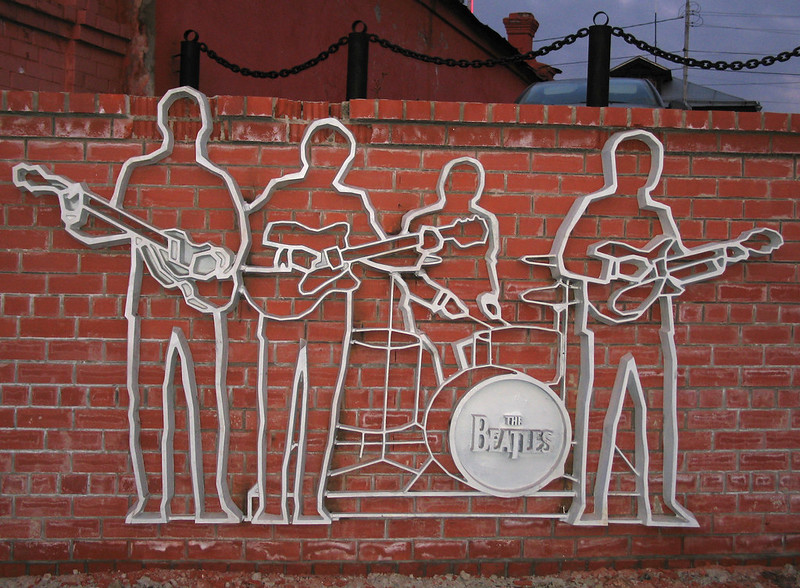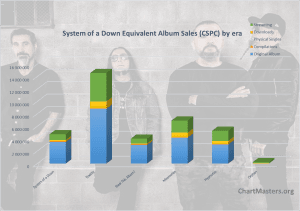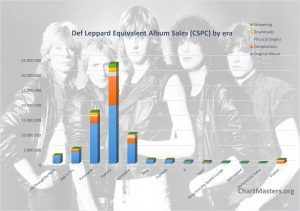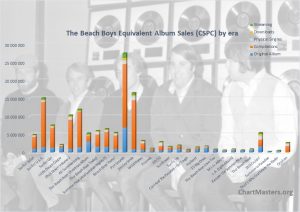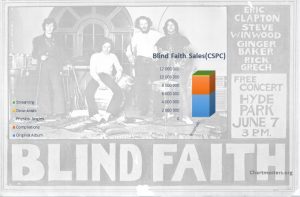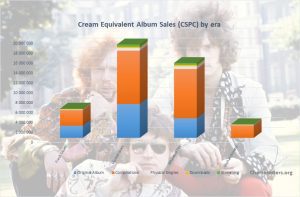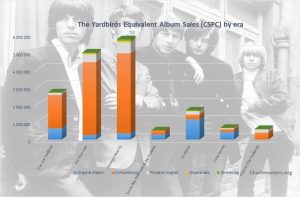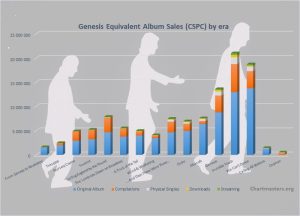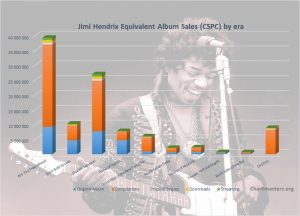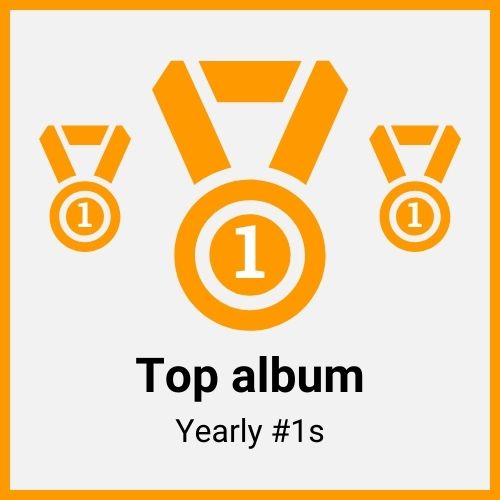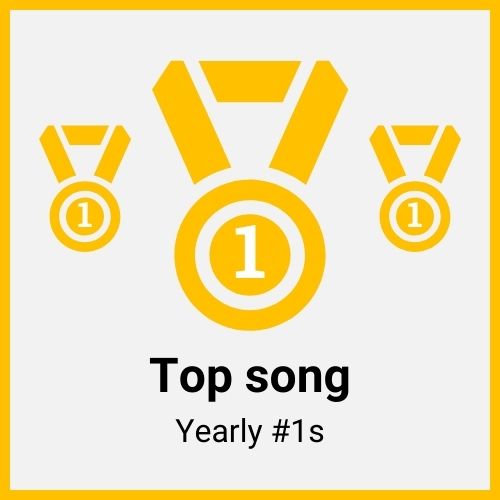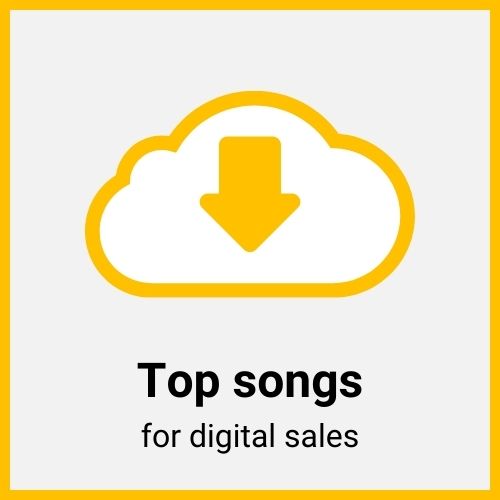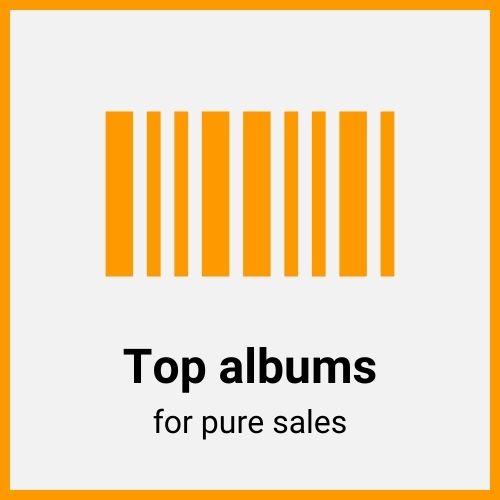The Beatles albums and songs sales
Do you feel this very special moment when starting to read such an article? That’s what happens when the daily subject is the Beatles. I won’t be creating a fake suspense – they are the biggest selling music act of all-time. The music industry hasn’t been the same after they fully redesigned the map when debuting way back in 1963. More than half a century later, identifying accurate information about their sales and their achievements is still a nightmare. Well, it still was until today!
You surely read it all – they sold more than anyone, their popularity is unparalleled, they topped 1 billion sales, shifted over 600 million albums, Sgt. Pepper LP is past 5 million copies in the UK, they broke every chart record in 1964 and got more million sellers than every other act. That’s what you read, not necessarily what is true. Indeed, all the numerical claims are purely fake.
Myself I have been going back and forth with their sales figures for 12 years until reaching at last a high point of satisfaction in an accuracy objective. I would like to particularly thanks the massive input from both Hernán Lopez and Anthony Blanchard that helped building what I can proudly announce as the most comprehensive, accurate and enlighting article ever published about the Beatles charts and sales.
Some of the information published in this post may surprise you and can also contradict official data, data which happens to be wrong. If anything concerns you, feel free to request additional details within’ comments section about data source and methods used to grant accuracy.
ChartMasters’ method: the CSPC
As usual, I’ll be using the Commensurate Sales to Popularity Concept (CSPC) in order to relevantly gauge the act’s results. It will not only bring you sales information for all albums, physical and download singles, as well as audio and video streaming. In fact, it will really determine the act’s popularity.
If you are not yet familiar with the CSPC method, below is a nice and short video of explaining the concept. I recommend watching it before reading on and to the sales figures. You’ll get the idea in just two minutes.
And if you want to know the full method as well as formulas, you can read the full introduction article.
Now let’s get into the artist’s detailed sales figures!
Original Albums Sales
Please Please Me (1963)
- America
- US – 1,775,000
- Canada – 165,000
- Argentina – 370,000
- Brazil – 160,000
- Mexico – N/A
- Asia
- Japan – 560,000
- Oceania
- Australia – 90,000
- New Zealand – 25,000
- Europe – 2,090,000
- UK – 1,235,000
- France – 110,000
- Germany – 240,000
- Italy – 60,000
- Spain – N/A
- Sweden – N/A
- Netherland – N/A
- Switzerland – N/A
- Austria – N/A
- Finland – N/A
- World – 5,900,000
With the Beatles (1963)

- America
- US – 1,375,000
- Canada – 135,000
- Argentina – 285,000
- Brazil – 160,000
- Mexico – N/A
- Asia
- Japan – 440,000
- Oceania
- Australia – 75,000
- New Zealand – 20,000
- Europe – 2,750,000
- UK – 1,620,000
- France – 85,000
- Germany – 380,000
- Italy – 60,000
- Spain – N/A
- Sweden – N/A
- Netherland – N/A
- Switzerland – N/A
- Austria – N/A
- Finland – N/A
- World – 5,850,000
A Hard Day’s Night (1964)
- America
- US – 4,775,000
- Canada – 290,000
- Argentina – 365,000
- Brazil – 220,000
- Mexico – N/A
- Asia
- Japan – 500,000
- Oceania
- Australia – 100,000
- New Zealand – 25,000
- Europe – 2,380,000
- UK – 1,415,000
- France – 110,000
- Germany – 290,000
- Italy – 50,000
- Spain – N/A
- Sweden – N/A
- Netherland – N/A
- Switzerland – N/A
- Austria – N/A
- Finland – N/A
- World – 9,350,000
Beatles for Sale (1964)
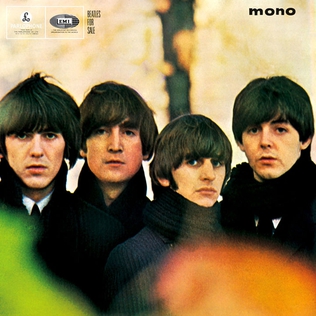
- America
- US – 1,475,000
- Canada – 135,000
- Argentina – 360,000
- Brazil – 175,000
- Mexico – N/A
- Asia
- Japan – 430,000
- Oceania
- Australia – 75,000
- New Zealand – 20,000
- Europe – 2,350,000
- UK – 1,465,000
- France – 85,000
- Germany – 270,000
- Italy – 60,000
- Spain – N/A
- Sweden – N/A
- Netherland – N/A
- Switzerland – N/A
- Austria – N/A
- Finland – N/A
- World – 5,650,000
Help! (1965)

- America
- US – 4,625,000
- Canada – 375,000
- Argentina – 485,000
- Brazil – 325,000
- Mexico – N/A
- Asia
- Japan – 650,000
- Oceania
- Australia – 100,000
- New Zealand – 25,000
- Europe – 2,380,000
- UK – 1,320,000
- France – 135,000
- Germany – 300,000
- Italy – 75,000
- Spain – N/A
- Sweden – N/A
- Netherland – N/A
- Switzerland – N/A
- Austria – N/A
- Finland – N/A
- World – 9,850,000
Rubber Soul (1965)
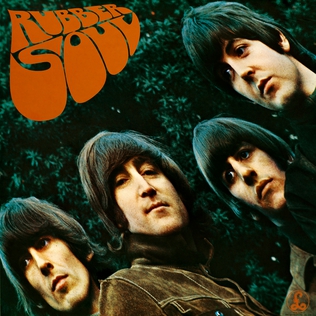
- America
- US – 8,275,000
- Canada – 500,000
- Argentina – 375,000
- Brazil – 240,000
- Mexico – N/A
- Asia
- Japan – 720,000
- Oceania
- Australia – 190,000
- New Zealand – 50,000
- Europe – 3,230,000
- UK – 1,730,000
- France – 155,000
- Germany – 460,000
- Italy – 105,000
- Spain – N/A
- Sweden – N/A
- Netherland – N/A
- Switzerland – N/A
- Austria – N/A
- Finland – N/A
- World – 14,400,000
Revolver (1966)
- America
- US – 6,500,000
- Canada – 425,000
- Argentina – 305,000
- Brazil – 240,000
- Mexico – N/A
- Asia
- Japan – 660,000
- Oceania
- Australia – 165,000
- New Zealand – 45,000
- Europe – 3,330,000
- UK – 1,890,000
- France – 190,000
- Germany – 390,000
- Italy – 120,000
- Spain – N/A
- Sweden – N/A
- Netherland – N/A
- Switzerland – N/A
- Austria – N/A
- Finland – N/A
- World – 12,450,000
Sgt. Pepper’s Lonely Hearts Club Band (1967)
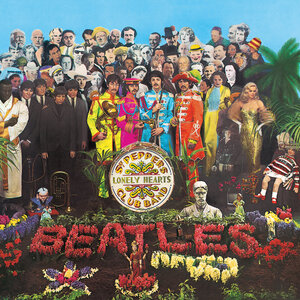
- America
- US – 14,075,000
- Canada – 1,175,000
- Argentina – 400,000
- Brazil – 280,000
- Mexico – N/A
- Asia
- Japan – 1,020,000
- Oceania
- Australia – 450,000
- New Zealand – 120,000
- Europe – 6,110,000
- UK – 3,290,000
- France – 385,000
- Germany – 780,000
- Italy – 210,000
- Spain – N/A
- Sweden – N/A
- Netherland – N/A
- Switzerland – N/A
- Austria – N/A
- Finland – N/A
- World – 24,800,000
Magical Mystery Tour (1967)
- America
- US – 7,150,000
- Canada – 575,000
- Argentina – 105,000
- Brazil – 150,000
- Mexico – N/A
- Asia
- Japan – 625,000
- Oceania
- Australia – 135,000
- New Zealand – 35,000
- Europe – 1,350,000
- UK – 615,000
- France – 120,000
- Germany – 190,000
- Italy – 60,000
- Spain – N/A
- Sweden – N/A
- Netherland – N/A
- Switzerland – N/A
- Austria – N/A
- Finland – N/A
- World – 10,600,000
The Beatles (White Album) (1968)
- America
- US – 11,475,000
- Canada – 750,000
- Argentina – 300,000
- Brazil – 250,000
- Mexico – N/A
- Asia
- Japan – 950,000
- Oceania
- Australia – 300,000
- New Zealand – 80,000
- Europe – 3,970,000
- UK – 1,720,000
- France – 390,000
- Germany – 555,000
- Italy – 200,000
- Spain – N/A
- Sweden – N/A
- Netherland – N/A
- Switzerland – N/A
- Austria – N/A
- Finland – N/A
- World – 19,000,000
Yellow Submarine (1969)

- America
- US – 2,150,000
- Canada – 125,000
- Argentina – 195,000
- Brazil – 170,000
- Mexico – N/A
- Asia
- Japan – 310,000
- Oceania
- Australia – 45,000
- New Zealand – 10,000
- Europe – 820,000
- UK – 300,000
- France – 100,000
- Germany – 115,000
- Italy – 60,000
- Spain – N/A
- Sweden – N/A
- Netherland – N/A
- Switzerland – N/A
- Austria – N/A
- Finland – N/A
- World – 4,200,000
Abbey Road (1969)

- America
- US – 15,275,000
- Canada – 1,475,000
- Argentina – 485,000
- Brazil – 425,000
- Mexico – N/A
- Asia
- Japan – 1,920,000
- Oceania
- Australia – 390,000
- New Zealand – 105,000
- Europe – 5,070,000
- UK – 2,080,000
- France – 425,000
- Germany – 840,000
- Italy – 240,000
- Spain – N/A
- Sweden – N/A
- Netherland – 275,000
- Switzerland – N/A
- Austria – N/A
- Finland – N/A
- World – 26,700,000
Let It Be (1970)

- America
- US – 5,625,000
- Canada – 475,000
- Argentina – 415,000
- Brazil – 225,000
- Mexico – N/A
- Asia
- Japan – 1,600,000
- Oceania
- Australia – 205,000
- New Zealand – 55,000
- Europe – 2,180,000
- UK – 950,000
- France – 205,000
- Germany – 320,000
- Italy – 100,000
- Spain – N/A
- Sweden – N/A
- Netherland – 100,000
- Switzerland – N/A
- Austria – N/A
- Finland – N/A
- World – 11,900,000
Original Album Sales – Comments
A gran total of 160,65 million copies sold across 13 studio albums, which include their various soundtracks. No doubt many will rate this total as kind of disappointing. For several reasons, it would be jumping on conclusions too fast though.
First, you need to consider market constraints. Their mid-60s albums were selling in the 10,000 to 30,000 range in Italy, a pale number. Not that big there? Far from that, along with local legend Mina they were the biggest sellers. Album sales were just abysmal as a whole. Apply that situation to most markets and you realize that the huge majority of their sales came as catalog results. Even a monster like Sgt Pepper’s on a solid market like Germany only sold an estimated 155,000 units in its first year, multiplying its sales by five since.
Second, not all studio albums of the Beatles were studio albums. Until Rubber Soul, their LPs were getting local releases, most notably in the US. This is why Please Please Me, With The Beatles and Beatles For Sale sold so much less than the others, because they first came out in that country during their 1987 CD releases. Instead, they got 7 major US albums from 1964 to 1966 which sold a huge 19 million units to date, led by Meet The Beatles! at 5,8 million. Of course, we are not going to ignore those releases. In a CSPC logic, they will be treated within’ the Compilations Category which comes later on the article with their sales re-assigned to original albums depending on their tracklist.
Third, from their earliest years the band issued various compilations, with Red / Blue albums from 1973 and 2000 set One leading the pack. Such releases invariably diminish the catalog appeal of original albums. Just like locally issued records, those greatest hits type of LPs will be treated later in this article inside the Compilations Category.
Fourth, the Beatles weren’t exclusive album sellers. During their hey-days, they sold tons of singles too. This is very precisely the next format to be detailed on following pages…
1963 Please Please Me – 5,900,000
1963 With the Beatles – 5,850,000
1964 A Hard Day’s Night – 9,350,000
1964 Beatles for Sale – 5,650,000
1965 Help! – 9,850,000
1965 Rubber Soul – 14,400,000
1966 Revolver – 12,450,000
1967 Sgt. Pepper’s Lonely Hearts Club Band – 24,800,000
1967 Magical Mystery Tour – 10,600,000
1968 The Beatles (White Album) – 19,000,000
1969 Yellow Submarine – 4,200,000
1969 Abbey Road – 26,700,000
1970 Let It Be – 11,900,000
Physical Singles Sales
If the LP market was terrible during the 60s, the single one was pretty powerful in various countries. Way back in 1963, the norm in terms of releases was different than from our days. The one of today got fully generalized during the 80s with albums-axed eras. All singles of an artist are part of his albums. The Beatles in their side had two distinct discographies, the one made of their LPs, out of which some singles got issued – or not – in some markets, and then fully stand-alone singles.
All those non-album tracks are inserted into the Orphan Album category. If you aren’t used to read CSPC articles, the Orphan Album is a folder which encapsulates every material issued outside of an album era. For most artists, that will be a few singles from compilations or a soundtrack, but for the Liverpool heros it is various widely popular songs dropped all along their active years. That album will come at the end of this category.
As a reminder, the weighting is done with a 10 to 3 ratio between one album and one physical single.
Which song is the highest selling physical single for the band? How many units have they sold overall in this format? Answers come right now!
1963-64
Well, it’s difficult to make a definitive list of which single was part of an album or not. For example, in the US, where it sold the majority of its copies, Twist and Shout was part of Introducing… the Beatles, a Vee-Jay label local album. In fact, none of the albums from this page was released in the US before 1987. Anyway, in terms of created value, the song came out within’ Please Please Me LP.
Anyway, technicalities apart, after a string of big 1963 hits in the UK, the Beatles stormed into the US charts like no one else in 1964, destroying everything. At the end of their first year, they had amassed an unreal 30 Hot 100 hits including 6 chart toppers. Not all of them are there, many belong to the Orphan Album category. Still, those albums are responsible for singles moving 12 million physical copies combined, more than 8 million of which managed by Please Please Me hits.
Please Please Me (1963) – 2,535,000 equivalent albums
Misery – 125,000
Boys – 50,000
Please Please Me – 2,300,000
Love Me Do – 2,650,000
Baby It’s You – 375,000
Do You Want to Know a Secret? – 1,250,000
Twist and Shout – 1,700,000
With the Beatles (1963) – 255,000 equivalent albums
All My Loving – 550,000
Please Mister Postman – 100,000
Roll Over Beethoven – 200,000
Beatles for Sale (1964) – 840,000 equivalent albums
Rock and Roll Music – 650,000
Eight Days a Week – 2,150,000
1964-65
Those two soundtrack albums had the advantage to be issued almost everywhere with the same singles being available in many countries. The result is mind-blowing with 5 songs from those LPs moving past 3 million copies each, a figure hardly ever reached by other artists. The 8 singles listed on this page combine for a huge 21 million units sold.
A Hard Day’s Night (1964) – 2,955,000 equivalent albums
A Hard Day’s Night – 3,750,000
Should Have Known Better – 400,000
And I Love Her – 900,000
Can’t Buy Me Love – 4,300,000
I’ll Cry Instead – 500,000
Help! (1965) – 3,345,000 equivalent albums
Help! – 4,400,000
Ticket to Ride – 3,350,000
Yesterday – 3,400,000
1965-66
With Rubber Soul & Revolver, the Beatles were now issuing the same albums everywhere. They were also clearly moving into an independent release schedule of albums and singles.
Outside of North America, Nowhere Man was almost released nowhere. Michelle shifted its million units in continental Europe, receiving no release in the US and in the UK to benefit the album instead. Got to Get You into My Life came out a decade later only to promote Rock N’ Roll Music compilation.
In other words, Yellow Submarine was the only track getting a worldwide release in physical single format, with an immediate response – 3,5 million units sold.
Rubber Soul (1965) – 720,000 equivalent albums
Nowhere Man – 1,400,000
Michelle – 1,000,000
Revolver (1966) – 1,320,000 equivalent albums
Yellow Submarine – 3,500,000
Got to Get You into My Life – 900,000
1967-68
More albums, same pattern of singles getting rarer and rarer. Sgt. Pepper’s Lonely Hearts Club Band single came out in 1978 only, Back in the U.S.S.R. in 1976 while Ob-La-Di, Ob-La-Da is the new Michelle selling exclusively in continental Europe.
As a Soundtrack and a record that wasn’t released everywhere upon release in LP format – it was a successful EP that we will meet later, Magical Mystery Tour got three proper singles with once again massive results as each topped the 3 million mark.
Sgt. Pepper’s Lonely Hearts Club Band (1967) – 75,000 equivalent albums
Sgt. Pepper’s Lonely Hearts Club Band – 250,000
Magical Mystery Tour (1967) – 3,345,000 equivalent albums
Hello, Goodbye – 4,300,000
Penny Lane – 3,200,000
All You Need Is Love – 3,650,000
The Beatles (White Album) (1968) – 450,000 equivalent albums
Back in the U.S.S.R. – 100,000
Ob-La-Di, Ob-La-Da – 1,400,000
1969-70
Reaching the latter part of their career, the most striking conclusion is that the band never did it wrong. Their singles continued to be gigantic smashes until the end as shown with their last 3 album singles moving nearly 11 million copies.
In total, physical singles from the band 13 studio albums sold a combined 63,8 million units, which in itself is enough to put the Beatles into the very biggest selling singles act of all-time. It is far from being over as the Orphan Album is coming strong…
Yellow Submarine (1969) – 30,000 equivalent albums
All Together Now – 100,000
Abbey Road (1969) – 1,185,000 equivalent albums
Something / Come Together – 3,950,000
Let It Be (1970) – 2,085,000 equivalent albums
Let It Be – 4,750,000
The Long and Winding Road – 2,200,000
Orphan songs
During their career, the Beatles released 9 non-album singles at a global scale. Each sold 2,7 million or better and 6 of them are quite simply the band top 6 selling hits of their career.
This situation perfectly illustrates the relevance of the CSPC approach. We can’t barely look at one format results and bring in conclusions. Figures suggest Hey Jude and I Want to Hold Your Hand are by far the biggest hits of their career. This is absolutely wrong. Both songs immensely enjoyed the fact they weren’t sold as part of albums too. If all their songs had been issued with the same background, they would no doubt be among the top performers, but they may very well have been topped by songs like Let It Be or Something / Come Together.
Nevermind, those songs amass the outstanding total of 52 million units, almost 46 million of which come from the 9 released in all markets.
Orphan – 15,683,000 equivalent albums
Hey Jude – 8,200,000
I Want to Hold Your Hand – 7,800,000
She Loves You – 5,400,000
We Can Work It Out / Day Tripper – 5,300,000
Get Back – 5,300,000
I Feel Fine – 4,900,000
Paperback Writer – 3,350,000
Lady Madonna – 2,750,000
The Ballad of John and Yoko – 2,700,000
From Me to You – 1,700,000
Free as a Bird – 1,000,000
The Beatles’ Movie Medley – 750,000
Real Love – 700,000
Matchbox – 500,000
My Bonnie – 450,000
Ain’t She Sweet – 400,000
Long Tall Sally – 350,000
Why – 125,000
Oh Darling – 100,000
Remaining Singles – 500,000
Career-wise, all those tracks add for a superb 115,6 million physical singles sold.
Studio albums and physical singles sales controversies
If you have been surprised by some figures in the high or low side, you won’t stay doubting long as the next few sections explain in details the most debatable figures from studio albums and physical singles lists!
Controversy #1: Sgt Pepper’s UK Album Sales
As stated by the OCC – Official Charts Company – Sgt Pepper’s Lonely Hearts Club Band sold over 5,1 million units in the UK. As such, it is certified by the BPI – British Phonographic Industry – 17xPlatinum with each Platinum disc representing 300,000 units sold.
Official, but fake. How is it possible that official information is wrong? You most likely noted the 3,29 million units sold in the album breakdown some pages earlier, a gigantic 1,8 million gap.
To understand such issues in official bodies we first need to put them into an historical context. Although founded in 1969, the OCC has been the official charts compiler for two decades only. Their system of sales scanned at retail started in 1994. Thus, their true official data starts from that year. On its side, the BPI started certifying records in 1973 and all sales happening before that date were not eligible for an award until 2013.
As a result, as official as the OCC claim their Sgt Pepper’s sales to be, it is barely an estimation based on old press by their in-house chart expert Alan Jones. The album was first claimed at 2,77 million sales in 1987 before jumping to 4,25 million in 1992. The OCC used those claims to add their own post-1994 figures in order to reach a cumulative tally. Both claims were far from being legitimate yet.
With sales being such a black box in the past, it was easy to claim anything. Easy to factor in as UK sales all units exported to various countries which had yet to develop their local market at the time, easy also to trick on wording by combining sales of distinct packages owning the Sgt Pepper’s track and claiming them to be pure studio album sales.
Although all industry insiders can’t be revealed for obvious reasons, sales of the album are quite well tracked in reality. Its net shipment topped the million mark in pure local sales early in 1973. Moving then more than 50,000 units a year, that number decreased steadily to barely over 10,000 units a year during the 80s with Blue compilation being the primary catalog force. It waited until the 1987 CD release to get relevant anew, shifting 170,000 copies for the year. Adding close to 300,000 more sales from 1988 to mid-1992, its EMI shipments from that date to 2008 are known, amassing an impressive 1,193,000 units. OCC scan system tells us it added over 230,000 copies sold since.
Doing the math, the total is close to 3,3 million with nearly 80% of those units being purely verified tallies, not involving any kind of estimate whatsoever a very little room for error in unknown periods as the album had close to zero chart activity during those years.
The argument of the biggest fanatics to try to maintain the 5+ million claim is the lawsuits that happened between the Beatles and EMI for unpaid royalties. As we will see later, the company used to elude their sales made under various leasing contracts with other labels through the years but UK sales have been controlled and fully reported by the label since day 1, making the argument irrelevant.
At nearly 3,3 million units, Sgt Pepper’s Lonely Hearts Club Band remains quite by far the biggest selling album in the UK from the 60s though.
Controversy #2: I Want To Hold Your Hand US / Global Sales
As the first and biggest selling single emerging during the Beatles invasion, I Want To Hold Your Hand has been the subject of various sales myths. Maybe more surprisingly, it is in the middle of myths in both sides – deflating and inflating its results.
Previously stated at 12 million in the US alone on various Medias, the accepted figure nowadays happens to be 5 million US sales, with the 12 million claim being assigned to Worldwide sales. This being said, those figures are strongly inflated.
In Hunter Davies official 1968 biography, the following figures were revealed:
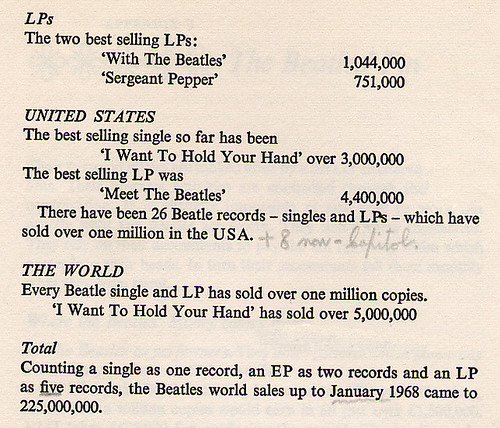
In fact, I Want To Hold Your Hand sold a bit more than 3 million – some 3,2 million to date. So 3,2 million in the US, 5 million worldwide, case closed? Not exactly. Figures from this scan are fully correct but they refer to EMI owned releases only.
In their initial years, the Beatles records were sold on a leasing agreement by Odeon in various countries. Among areas where it sold relevant numbers, I Want To Hold Your Hand wasn’t issued by EMI in Germany, France and Japan. This is why the single is well past 7 million units by now. It is even over the 7,5 million units sold by Hey Jude stated by EMI as the group top seller in their October 1972 report. The song Hey Jude itself hasn’t sold 7,5 million units but past 8 million instead by selling near half a million units in Japan plus some more copies in Latin America under various other labels.
Controversy #3: Cumulative Singles Sales
As you may understand, the case of I Want To Hold Your Hand and Hey Jude isn’t limited to those two songs.
In their October 1972 report, EMI stated the Beatles sold 100 million singles. There is a double-trick that we need to understand to take out the truth behind this figure.
The first in the negative side is that the figure indeed included all singles released in 1969/1971 by George Harrison, John Lennon, Ringo Starr and Paul McCartney as solo artists. This suggests sales of over 80 million only by them as a band. This number sounds way too low, especially for a band supposed to have sold over 1 billion records.
The figure is factual though, although it does refer to strictly EMI-owned sales. Those are sales of Capitol, Parlophone, Apple Records, but without Odeon, Mursaut, Vee-Jay, Swan etc.
In the US, Love Me Do, Please Please Me, She Loves You, Twist And Shout and Do You Want To Know A Secret combined for almost 7 million sales, all of them under non-EMI contracts. In France, all singles until Hello Goodbye included weren’t issued by EMI. In Germany, it was until Lady Madonna, while the first Japanese single owned by them was Ob-la-di, Ob-la-da. Argentina, Spain, Denmark, Netherlands, all had singles issued by distinct labels.
Thus, while fully factual the 100-million combined singles claim of EMI is misleading more than anything. By that date, the act the Beatles, without solo singles of its members, had sold already 110 million singles, plus a few millions more since.
Controversy #4: The Splash Strategy Illusion Part 1
As sales are nowhere near to be not known for all acts, all records about highest selling artists, albums or singles can be put under a shadow of doubt. Chart records can’t though. That’s what we think, but that is wrong too.
The Beatles chart achievements have been mind-blowing from their beginning, it is impossible to deny that. They still suggest higher success than what it has really been. The band got countless of chart toppers since disbanding, they also invade charts at every reissue campaign.
Rather than being simply impressed, our role at Chartmasters.org is to analyze those phenomenoms. Are they due to pure success only? The answer is no. In every business, everything depends on the supply to demand ratio.
The music industry, thanks to its print in the world culture, has many mechanics in place that create continuous interest in some records. Recurrent airplay, TV shows usage, covers, live shows, music magazines, playlists etc, the background is there providing the Beatles catalog linear exposure all year long. Whatever EMI does tomorrow, there will still be people regularly getting interested in buying Abbey Road or Revolver. Something EMI fully control though is the offer. For decades now they have been handling it to perfection with their gold mine named the Beatles.
What is called here the splash strategy is quite simple and well-known in various industries – held the supply for some time then flood the market. Exactly 30 years ago, they issued the first CD versions of the group albums. They performed better than anyone else CD releases.
Clearly, the worth of those albums helps, but if the splash upon release has been so big it is also due to a double retention from EMI. First, they waited quite long before dropping them. Most classic albums got issued in 1983 to 1985 in CD, in bulk among many other artists albums. EMI awaited for 1987 before dropping them in the spotlight of everyone. As music industry mecanics are still in place and creating interest as time passes no matter what and the supply wasn’t there, the demand was ever higher while waiting for those sets. More, EMI also took care of not releasing a CD compilation to first sell studio albums, adding to the offer Past Masters packages that contained missing hits from studio albums. Not only the demand was high for those CDs, but there had been no offer at all, not even a work around, to satisfy them.
In 1993, after enjoying years of huge catalog sales from their studio albums, EMI regenerated Red and Blue compilations. By then, the last Top 10 compilation in the US was 1976 set Rock N’ Roll Music. If someone wanted to pick a greatest hits album, it had to go after old LPs and Cassettes which were the only items available for many years. After creating such a background, it isn’t surprising that Red and Blue CD releases got shipped at a combined 5,5 million units within’ a couple of months. The same happened with Live at the BBC in 1994, the first live album issued in CD, some 17 years after the previous similar set, Live at the Hollywood Bowl, that was not released in CD format until much later.
With One, they did it again. The 1-CD compilation was long awaited creating a terrific wave of hype upon release.
Then came the digital era. While all artists moved to the new format as it happened two decades earlier with CD releases, thus being all a non-event, EMI did it the other way for the Beatles catalog. From the start of legal downloads in 2003 to the band availability in 2010, billions of tracks got downloaded. Why waiting until 2010 then? To force the buying of full high-priced albums and to strongly boost the 2009 albums remasters, making it a major event. Had people from all over the World been cherry-picking their main hits for years, their impact would have been much lower. Once again, compilations got reissued after studio albums – Red and Blue in 2010, One in 2011 – to fully maximize sales, first selling several studio albums then publishing the cash-in material.
Digital release was a event too, scheduled in November. Obviously, it was no coincidence. If pre-Christmas days are the hottest of the year for physical sales, downloads biggest time-frame is the couple of weeks after Christmas thanks to all teens spending the iTunes gift card they received that day. Thus, by issuing the Beatles catalog in November, EMI granted them a huge promotion just in time for Christmas purchases. This decision made sure consumers bought both remastered CDs and iTunes cards as gifts, boosting sales in both avenues.
Five years later on December 24 2015, for the exact same reason, EMI sent the Beatles catalog on all Streaming platforms. As offering a subscription isn’t an habit as iTunes cards were, they waited for Christmas purchases to be completed before revealing the catalog in streaming. They did so in 2015 since the break point that saw estimated streaming revenues getting bigger than estimated sales lost due to that availability got reached, after which they joined all other artists in those services.
All those successions of demand retention and hyped offer create the illusion of insane domination due to concentrated sales with various charts records, pushing uneducated chart followers to inflate their results and sales. It looks like a similar event – CD releases, remasters, download availability, streaming availability etc. – for the Beatles always outperformed insanely the results of other acts. If we get into details of each act, we would notice this is just not true. Results are undoubtedly way more visible thanks to perfectly timed and sized marketing campaigns, but not necessarily much bigger.
Controversy #5: One Billion Records Sold!
Checking reliable old press, we can identify various articles publishing a sales total for the Beatles. They had sold 150 million discs by August 1965, 225 million by January 1968, 545 million by October 1972, by 1984 the total was crossing 1 billion units.
Hm… not exactly in line with what is presented today. All those claims were correct, but we need to put them in their context to not be misled about their meaning. By the 60s, albums just ended to arrive. It took until mid-50s to see artists, famously Frank Sinatra, record an album as one unique piece of art, rather than simply packaging singles together. Sales of albums were also fairly weak in comparison to singles, while their price was much higher. Giving this background, the music industry standard was to speak about discs sold, a disc being a weighted unit depending on the format – yes, mathematical weighting hasn’t come in with Streaming.
What was one unit then? The barometer was the single, the most widely known and purchased format. One single was worth one single, one EP was worth two singles while one album was weighted at five units. This is how the 545 million tally was arrived at by 1972 in spite of the previously mentioned 100 million-only singles sold – the remaining 445 million units were made of slightly over 86 million albums, weighting for more than 430 million units, the rest being completed with EP sales.
Of course, those global claims involved also the two tricks previously met – sales of solo material was included, while proper Beatles records sales were excluded when achieved through a leasing with an other label. As you can see, this article was more than needed to sort all those misleading information!
Digital Singles Sales
As a reminder, the weighting is done with a 10 to 1,5 ratio between one album and one digital single.
From 2004 to 2007 the digital singles market was booming. From 2008 it was already mega huge, seriously challenging album sales as the main avenue consumers were selecting. During all those years, the Beatles were notably known for being part of digital world holdouts.
After years of negotiation on royalties amounts plus the inevitable need of putting their music available in iTunes & Cie due to the always larger number of people deciding to go by digital music only, their catalog ultimately appeared on downloads software in November 2010. Their first week sales of 2 million digital tracks – plus 450,000 albums, counting each album part of boxes independently – was widely marketed. What happened after was way less visible.
It doesn’t mean their sales were disappointing yet. They were surely not as-stellar-as one could have expect from the fab four. In the US, after shifting some 3 million singles by the end of 2010, their first full year of availability saw 4,7 million purchases. With the initial hype being over and the market falling from 2013, their 2012-2016 US sales dropped year by year at 3,5 million, 3,3 million, 2,9 million, 2,5 million and 1,9 million units. This still translates into a healthy 22 million units to date.
Elsewhere, sales have been solid too, although not as high as their US showing. The band recently crossed 2 million digital single sales in the UK and 1 million in South Korea with a worldwide total now up to 35 million.
Let’s break down those sales era by era over the next sections, going through every big hit.
1963-64
Album sales of the Beatles are very linear over their early albums, most of which sold roughly the same. On those digital sales, we start seeing a phenomenon very rare – the complete my discography logic.
The huge majority of artists need hits to sell albums. Let’s make it even clearer – all acts, as much of an album act as it may be regarded, sell their albums proportionally to the strength of the hits on them. No matter if you are speaking about Take That or Led Zeppelin, this remains true.
Beatles early albums keep on selling very similar amounts year after year. Nevertheless, digital results of their songs are way less in par between each of them. Please Please Me outperforms Beatles For Sale by more than 3 to 1 with Twist And Shout alone sells more units than the latter album.
Why the hell do those albums sell the same then? They are all on a fairly lower league than their latter albums in terms of reputation. The band name on its side is insanely popular. Their discography is relatively small and regarded as essential by many music lovers. All those facts combined together create a unique situation where the strength of hits is not enough of a factor against the complete my discography target. In other words, when a consumer starts considering buying one of those early albums, he most likely picked already at least 5 or 6 of the band records and is already aiming to buy them all.
With less than 6 million units sold in digital single format for all their tracks, those albums do not perform that well there. No song from this era reaches 1 million units.
Please Please Me (1963) – 360,000 equivalent albums
Love Me Do – 300,000
Do You Want to Know a Secret? – 200,000
Twist and Shout – 800,000
I Saw Her Standing There – 550,000
Remaining Tracks – 550,000
With the Beatles (1963) – 135,000 equivalent albums
All My Loving – 350,000
Remaining Tracks – 550,000
A Hard Day’s Night (1964) – 251,000 equivalent albums
A Hard Day’s Night – 400,000
If I Fell – 200,000
And I Love Her – 225,000
Can’t Buy Me Love – 350,000
I Should Have Known Better – 200,000
Remaining Tracks – 300,000
Beatles for Sale (1964) – 113,000 equivalent albums
I’ll Follow the Sun – 200,000
Eight Days a Week – 200,000
Remaining Tracks – 350,000
1965-66
I’ll give back some justice to this era. The Beatles early albums are often regarded as cute. The Sgt Pepper’s / White Album / Abbey Road trilogy rated as the absolute best albums of all-time and sales monsters too. We tend to forget a 2-years era happened in-between. Those 1965/1966 years were pivotal for the band. During them, they switched from catchy or lovely tunes to more complex but also incredibly memorable songs. In that aspect, Yesterday represents pretty much a bridge from their early years to their latter years. What more natural then that seeing it as their first million selling digital song in the release chronological order.
All those albums have cumulative sales over 2 million for their tracks, representing more than 300,000 equivalent album sales for each.
Help! (1965) – 409,000 equivalent albums
Help! – 525,000
Ticket to Ride – 300,000
You’ve Got to Hide Your Love Away – 300,000
Yesterday – 1,100,000
Remaining Tracks – 500,000
Rubber Soul (1965) – 360,000 equivalent albums
Nowhere Man – 175,000
Michelle – 175,000
Drive My Car – 175,000
Norwegian Wood (This Bird Has Flown) – 325,000
In My Life – 1,000,000
Remaining Tracks – 550,000
Revolver (1966) – 304,000 equivalent albums
Taxman – 150,000
Good Day Sunshine – 150,000
Eleanor Rigby – 600,000
Yellow Submarine – 300,000
Got to Get You into My Life – 175,000
Remaining Tracks – 650,000
1967-69
One may expect wonders from Sgt Pepper’s album tracks. Its full track list is no doubt impressive, but the lack of hits fire-back on it, resulting in a pretty average tally of download single sales by the band standards. As a double LP full of well known tunes the White Album amasses well past 4 million sales from its digital tracks in spite of no individual song going over 700,000 units. Interestingly, 700,000 units is very precisely the highest level attained by all those songs, with several album tracks out-performing supposed singles. Those two facts together highlight how much those eras were promoted around full albums instead of pushing hard being a couple of songs.
Sgt. Pepper’s Lonely Hearts Club Band (1967) – 379,000 equivalent albums
Sgt. Pepper’s Lonely Hearts Club Band – 300,000
Lucy in the Sky with Diamonds – 400,000
A Day in the Life – 450,000
When I’m Sixty-Four – 225,000
With a Little Help from My Friends – 550,000
Remaining Tracks – 600,000
Magical Mystery Tour (1967) – 386,000 equivalent albums
Hello, Goodbye – 300,000
Penny Lane – 375,000
Strawberry Fields Forever – 450,000
I Am the Walrus – 400,000
Magical Mystery Tour – 150,000
All You Need Is Love – 550,000
Remaining Tracks – 350,000
The Beatles (White Album) (1968) – 664,000 equivalent albums
Back in the U.S.S.R. – 325,000
Ob-La-Di, Ob-La-Da – 450,000
While My Guitar Gently Weeps – 600,000
Revolution – 350,000
Blackbird – 700,000
Dear Prudence – 250,000
Rocky Raccoon – 200,000
Helter Skelter – 150,000
Remaining Tracks – 1,400,000
Yellow Submarine (1969) – 68,000 equivalent albums
Hey Bulldog – 175,000
Remaining Tracks – 275,000
1969-70 and orphan songs
A mere 6 songs only from the Beatles crossed the million sales in downloads, a low number even if they shine by their consistency across their entire catalog. Two of them found place on Abbey Road album yet, the ever-growing Here Comes The Sun plus Come Together.
From the Orphan Album, I Want To Hold Your Hand and She Loves You were terrific seller back in the day thanks to their unavailability on one studio album but their popularity largely faded with years and that early days advantage isn’t relevant anymore. The only song that outsold them in physical format, Hey Jude, is still going strong though with a sizable 1,65 million downloads.
Of course, the main track from this page is Let It Be, which is the only hit from the iconic group up to 2 million units sold.
Abbey Road (1969) – 731,000 equivalent albums
Come Together – 1,100,000
Something – 325,000
Here Comes the Sun – 1,700,000
Oh! Darling – 200,000
Golden Slumbers – 150,000
Remaining Tracks – 1,400,000
Let It Be (1970) – 510,000 equivalent albums
Let It Be – 2,000,000
The Long and Winding Road – 325,000
Get Back – 225,000
Across The Universe – 200,000
Remaining Tracks – 650,000
Orphan – 615,000 equivalent albums
I Want to Hold Your Hand – 400,000
From Me to You – 175,000
She Loves You – 275,000
I Feel Fine – 200,000
We Can Work It Out – 200,000
Day Tripper – 175,000
Paperback Writer – 150,000
Lady Madonna – 150,000
Hey Jude – 1,650,000
The Ballad of John and Yoko – 150,000
Don’t Let Me Down – 125,000
Remaining Tracks – 450,000
Streaming Sales
The Beatles have got a unique relation with each and every format. The last one which emerged more than 40 years after they disbanded still saw them adopting an atypical strategy. Holding out their catalog for years just like they did on download platforms before, they came into the streaming world for 2015 Christmas day.
The ‘Beatles are on Spotify!‘ was a hot news, the last Splash Strategy used by EMI to date. Results have been fairly strong with 1 billion streams reached by June 30 2016 and 2 billion by December 20 2016. As their arrival was extensively marketed along with the Spotify brand and due to success demographics of the group perfectly fitting with the Swedish giant distribution, their plays on that specific platform have been a tremendous part of their overall streams. By the date 2 billion milestone was hit, their Spotify results amounted for 1,27 billion, a notable 63,5% of their total streams. Thus, this proportion will be used on all figures presented on this category to extrapolate their Spotify numbers into global ones.
We will be reviewing streams from all their songs and all their albums, converting each of them into equivalent album sales. The equivalent album sales is the division of the comprehensive streaming figure by 1500 as it is now the norm in the new industry model.
Streaming Part 1 – Breakthrough Albums
Before getting into big hits, the first striking element from streams of the group first three albums is their consistency. Each and every song on them has at least 1 million plays, a very solid showing, even more considering they have been running for 14 months only.
Still, total equivalent sales show a 3 to 1 lead of Please Please Me over With the Beatles. Streaming make it no different than in the past – it’s the big hits that drive sales, whatever format you are talking about. Both Love Me Do and Twist And Shout crack the 30 million barrier while the likes Please Mister Postman and Roll Over Beethoven have 10 times less streams.
Songs from A Hard Day’s Night are in-between performance wise. The title track has 24 million streams while Can’t Buy Me Love posts a strong 19 million.
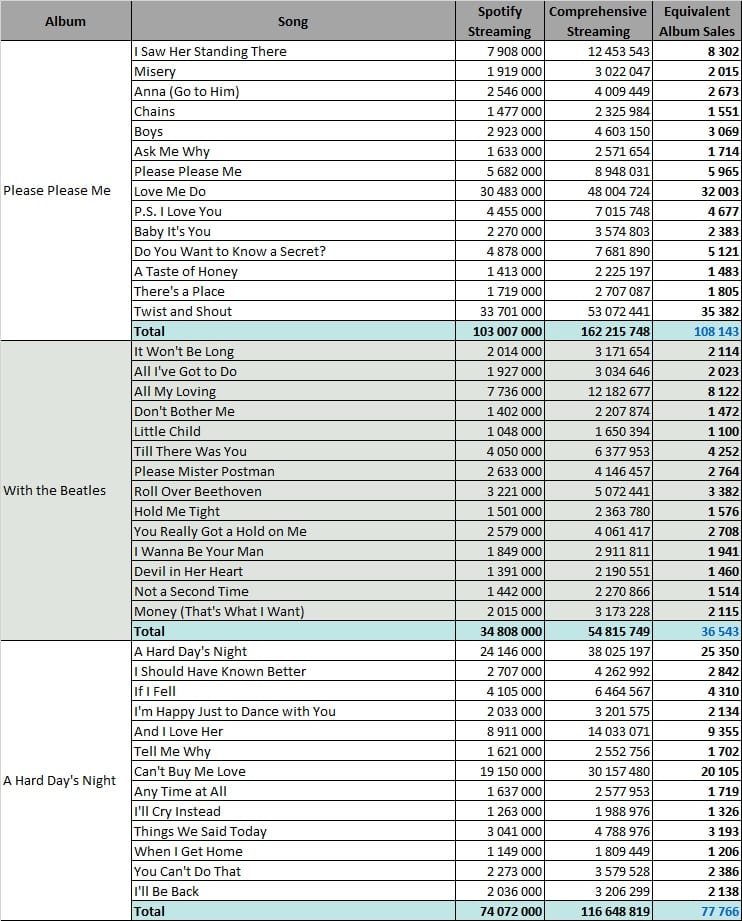
Streaming Part 2 – For Sale… & Stream
The string of 1 million plus plays songs continues with the full track lists of both Beatles For Sale and Help!. The former lacks a bit of big hits with only Eight Days a Week closing in 15 million. This implies a relatively low 38,000 equivalent album sales.
At 125,000 units the latter is much stronger. Help! achieves this total thanks to the title track at 26 million, Ticket To Ride at 18 million and of course the cult Yesterday which rides high at 43 million.
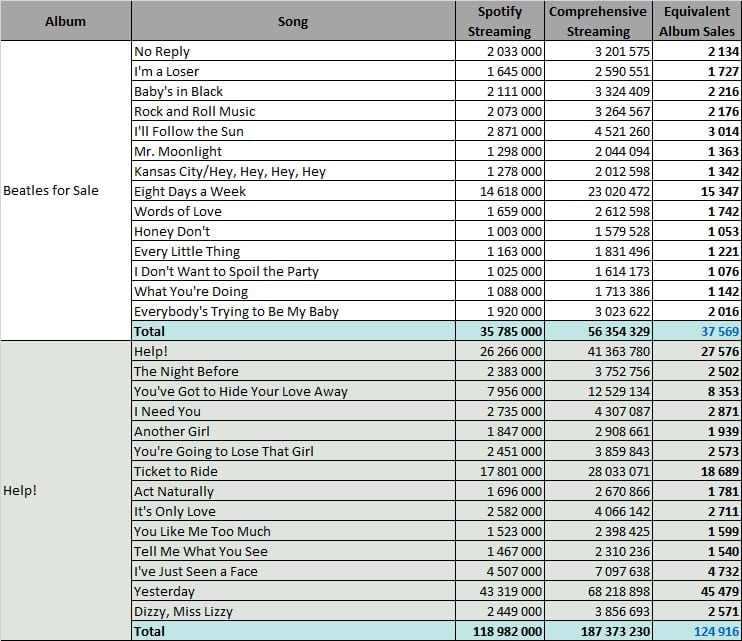
Streaming Part 3 – Pivotal Years
Both Rubber Soul and Revolver contain two songs a piece at 20 million streams give or take a few millions. This is quite similar, or even slightly lower, than the previous five albums.
There is still one difference though. While the early albums have all their tracks at 1 million or more, each song from Rubber Soul and Revolver are on 2,2 million plus. If topping 3 million was the trademark of hits within’ their early years material, it turns out to be the norm on those records.
Once again, hits sell better than consistent album tracks still. At 99,000 and 104,000 equivalent album sales respectively, they fell short of Please Please Me and Help! which contain bigger smashes.
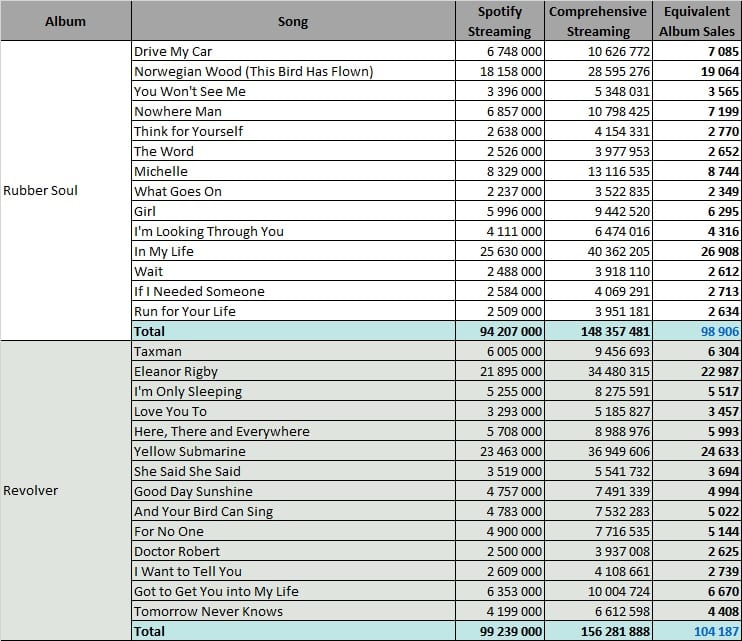
Streaming Part 4 – All You Need is Sgt. Pepper’s
The aforementioned transition into more album-oriented eras gets truly visible here. Almost all songs from Sgt Pepper’s album are at 4 million and more, yet no hit reaches 16 million, meaning the full track list minus one song fall into a 4 to 1 ballpark. As a comparison, the ballpark was 25 to 1 on Please Please Me.
Surprisingly, while its consistency should be highlighted, the overall total of the 1967 classic remains fairly weak. At 95,000 equivalent album sales, it is even topped by Magical Mystery Tour, among others. 1966 Rolling Stones album Aftermath, arguably nowhere near as iconic as Sgt Pepper’s, destroys its streaming results with 261,000 equivalent album sales as of December 3 2016. Of course one may argue the Beatles arrived late in Streaming World, but considering how much it has been booming month after month even if they had been available since the beginning this album would still be well under its Stones challenger.
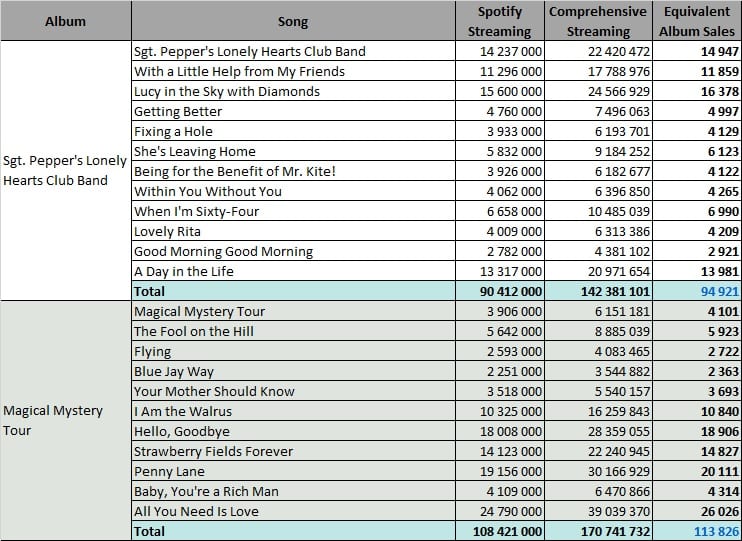
Streaming Part 5 – The Revolution Continues
Up to this page, the Beatles strongest album in streaming format remains Help! at 125,000 equivalent album sales. This high is now topped by their eponymous 1968 album which registers 178,000 sales.
If album tracks fail to make the difference against hits, an extensive 30-songs list undoubtedly helps. It must be said too that Beatles songs are fairly short, running around 3 minutes on average. If you press play at the same time on Wish You Were Here album by Pink Floyd and on this Beatles White Album, by the end of the latter – some 93 minutes later – you will have added 30 streams to the Beatles, but only 11 to Pink Floyd. While the length of a hit often playlisted is irrelevant while comparing huge smashes, when we refer to album tracks reached only from the artist page this criteria makes a notable difference and is highly favorable to the Beatles.
Just like it was their weakest release during their hey-days, Yellow Submarine is by far their worst performer in streaming too. Its biggest song is on 3 million plays only while half of its tracks fail to break the million mark, a milestone managed by every album track from the remaining 12 studio albums. Of course, the most well-known songs on it, Yellow Submarine and All You Need Is Love do not appear because they were already considered into their original studio albums.
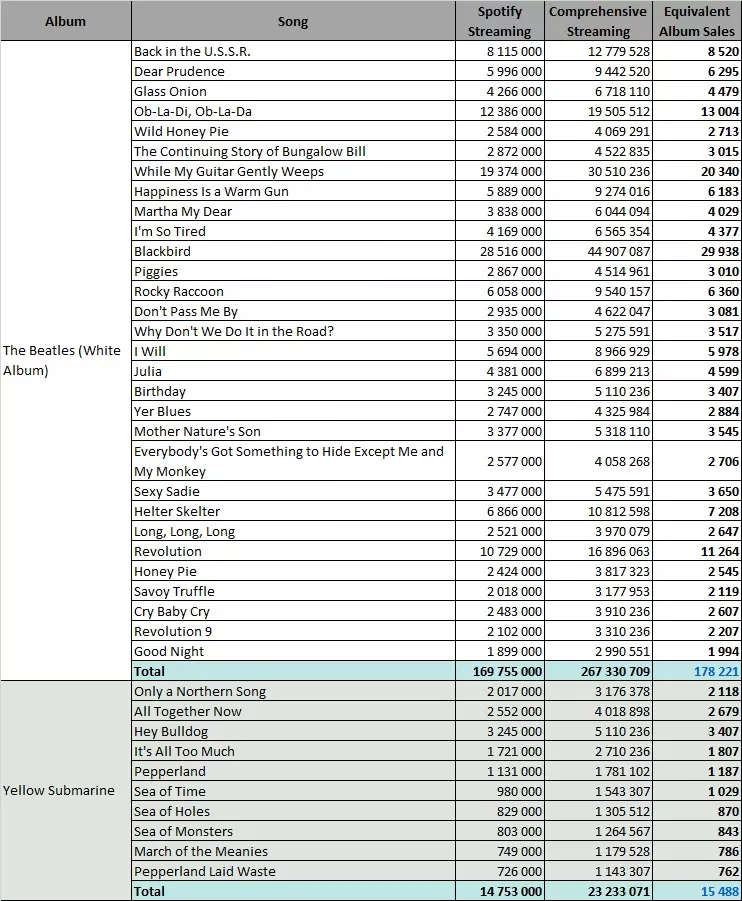
Streaming Part 6 – The Long and Winning Road
From Abbey Road, you can forget about Her Majesty which runs under 30 seconds and thus doesn’t trigger a count when playing it. Just like all those interludes, there is a few streams still displayed, possibly from users with a specific account or with some calculation involved.
Back to proper comments, Abbey Road blockbuster is home of absolutely massive hits, Come Together and Here Comes The Sun. The latter is the most streamed Beatles song. Combined, they account for 115 million Spotify plays. The album as a whole is fairly huge with its weakest songs on their way to break the 5 million mark soon. One more time, we can’t elude from commenting on songs length. The last six songs pre-Her Majesty total the minuscule 9 minutes 28 seconds – average of 1:34 – which boosts considerably album tracks. Nevermind, at 240,000 equivalent album sales, its results are pretty healthy.
The lead track of Let It Be is massive on its own too, up to 50 million. An additional 3 more hits are over 10 million while tracks all top 3 million. This puts Let It Be on 133,000 equivalent album sales from streaming, the 3rd highest total of the band.
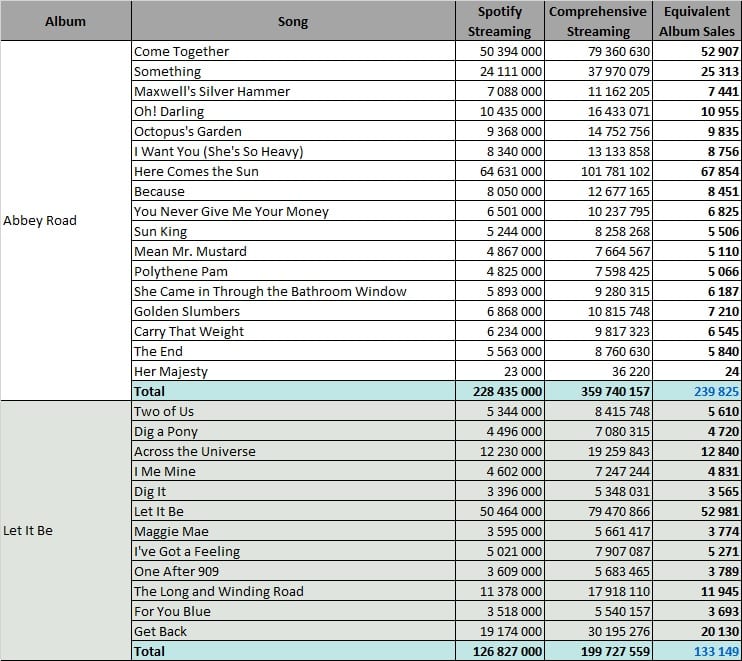
Streaming Part 7 – Not Orphan of Success
This melting pot of songs from various horizons includes some of the most notorious Beatles success. We saw within’ the physical singles sales that their top 6 selling singles were from the Orphan Album folder. Without the advantage of being available on only one format while others were part of albums too, those songs are not leading the pack anymore in Streaming.
Hey Jude is close to 45 million still, followed by I Want To Hold Your Hand at 34 million and She Loves You at 21 million. It’s interesting to notice that between themselves, sales ranking of Orphan songs is still respected – this is the same Top 3 in each physical, download and streaming sales. When comparing to studio album singles though, the Orphan songs are much higher in physical sales. This reveals in a very clear way the immediate and mutual cannibalization impact of physical singles vs albums releases.
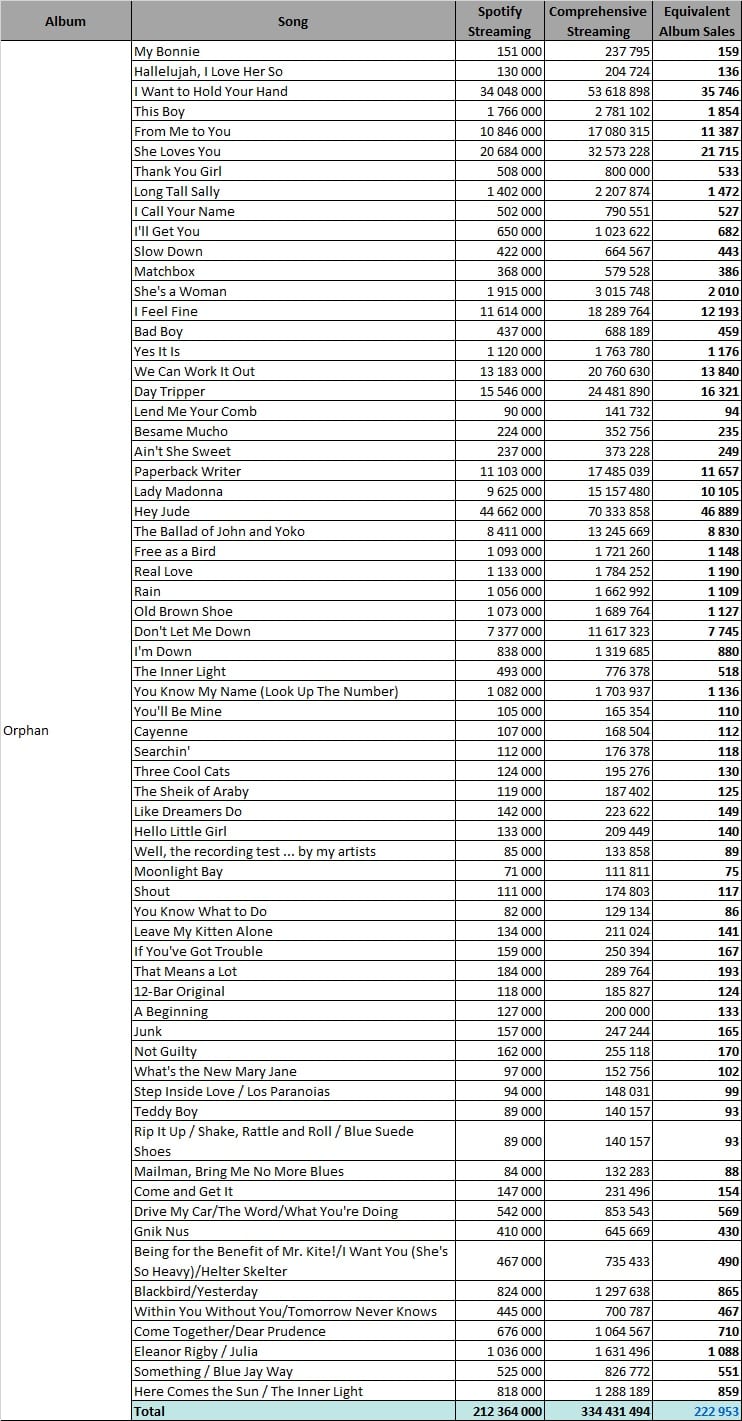
Streaming Part 8 – Unavailable tunes
Here is a complete list of songs that have yet to be made available on Spotify. Nothing from it is part of the group essential material – far from that, they are fillers from various interview records, live albums or whatever. They wouldn’t bring much if added. Instead, they would likely downgrade the user experience of the one who is playing in random mode on their artist page.

Full Length related records Sales
It sounds fairly logical to add together weighted sales of one era – studio album, physical single, downloads, streams – to get the full picture of an album popularity. For older releases though, they also generate sales of various live, music videos and compilation albums.
All those packaging-only records do not create value, they exploit the one originated from the parent studio album of each of its tracks instead. Inevitably, when such compilations are issued this downgrades catalog sales of the original LP. Thus, to perfectly gauge how worth this latter is, we need to re-assign sales proportionally to its contribution of all compilations which feature its songs. The following table explains it all.
Remaining Long Format Part 1 – US Albums #1
I previously mentioned how Please Please Me, With the Beatles and Beatles for Sale weren’t available in the US until the CD issue of 1987. In fact, they got locally issued albums instead including the first batch listed on this table.
On various articles listing the Beatles sales, they tend to add directly total US album sales into the UK releases as per the chronological order. For example, the second main US album Meet the Beatles! gets mixed with the second main UK LP With the Beatles. As shown in the table, this is a wrong assumption. The album not only has tracks from Please Please Me, but it also sold that well in the US thanks to the inclusion of popular stand-alone hits like I Want to Hold Your Hand.
How to understand the table from the picture? For each compilation, we first define its sales. Sticking to our example, Meet the Beatles! sold 6,1 million units in the few countries it got released. Its tracks combine for 66,7 million streams on Spotify. Those tracks got initially released from 3 original sources which are the albums listed in the fourth column. Then we learn that songs first issued on With the Beatles are responsible for 34% of Meet the Beatles! total streams, meaning it created 34% of its appeal which is the equivalent of 2,101,000 sales.
Naturally, as both I Want to Hold Your Hand and She Loves You, the Beatles biggest early hits, were issued as Orphan tracks, this folder album appears to be responsible for most of those US packages sales.

Remaining Long Format Part 2 – US Albums #2
Continuing to go through their US albums, we face four additional million sellers. Issued in 1964/1966, they cover mostly songs from A Hard Day’s Night, Beatles For Sale and Help!. We can notice that Beatles for Sale generated more than 3 million sales through Beatles ’65 and Beatles VI, both of which sold a lot of copies on the back of its hits.
Once again, Orphan songs appear to be a tremendous addition to those packages. The situation we started to pass by when checking singles sales is visible again – the Beatles have not one but two discographies, their studio album outputs plus their stand-alone hits. That sounds quite theoretical but brings a real and massive difference to their final total as we are going to see.
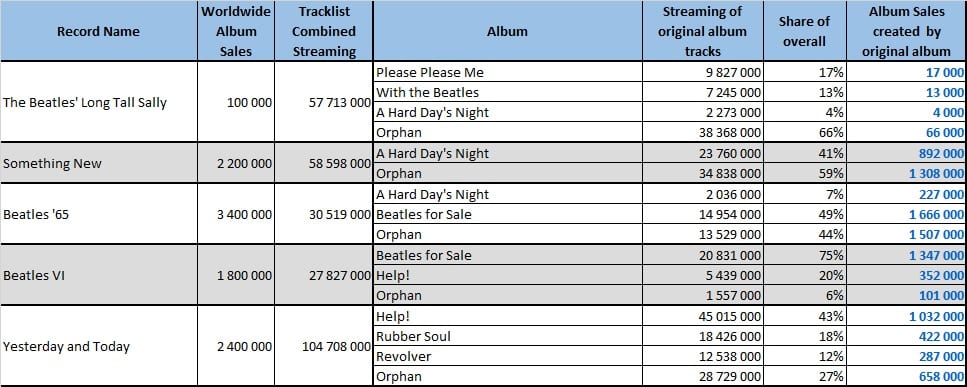
Remaining Long Format Part 3 – Local Releases
The US isn’t the only country that got local releases. In plenty of countries their 1963 to 1966 releases were local ones like the few listed here. If other local albums got incorporated into studio albums estimates already, that set of records had specific track lists of songs coming from distinct albums.
The most notable album from this list is The Early Beatles. This record was a Capitol-made replacement of Vee-Jay owned Introducing… the Beatles that got deleted in late 1964 due to legal issues. Thanks to the CSPC, we can get ride of those technicalities and assign sales of all those packages into the real value creator, Please Please Me.
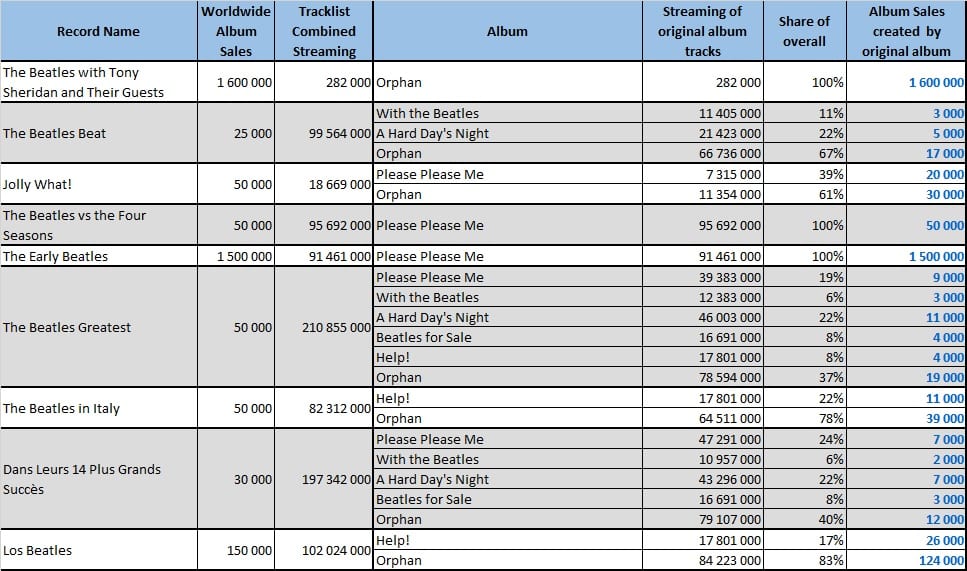
Remaining Long Format Part 4 – EPs
Seeing the likes Please Please Me, With the Beatles and Beatles For Sale around 6 million copies sold to date in their original format make them look much weaker than their latter material. The reality is different through. Those albums have not only generated sales of various other similar local releases, they also contributed immensely into millions of EP sales.
As per CSPC rules, an EP is weighted as half of an album. The only exception is Magical Mystery Tour EP which was a double one, thus getting back a full one album equivalent weighting. This makes perfect sense as this EP was exactly released instead of the album in some countries back in the day, including in the UK.
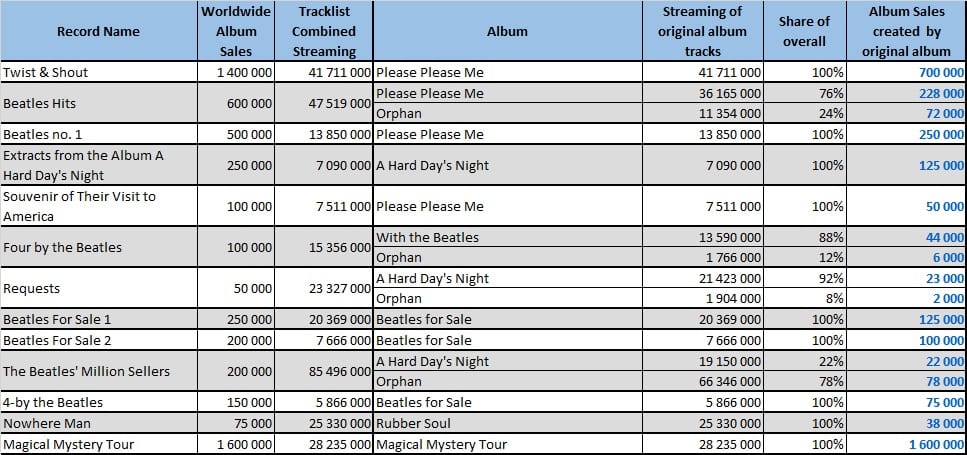
Remaining Long Format Part 5 – Double Compilations #1
Disbanding in 1970, the Beatles continued to register smash hits as solo artists in 1971/1972. Their catalog was still truly hot and well deserving a comprehensive greatest hits album. There was so much material available that the first one coming out was a double-double LP release, Red and Blue albums, covering respectively 1962-1966 and 1967-1970 periods.
If many people already owned their studio albums, the fact that so many huge hits got issued outside of them made those packages essential, shifting an immense 44,8 million units combined. From the Red album, the leading force is unsurprisingly the orphan tracks which were very numerous in their early days. Maybe not as expected is the strong position Help! album. Owner of widely popular songs like Yesterday, Help! and Ticket to Ride, it contributes greatly to the compilation appeal at 22%.
From the Blue period, the main strength is clearly Abbey Road which has classic tunes like Come Together and Here Comes The Sun. The impressive second is Magical Mystery Tour. Rarely praised at the heights of their other 1967-1970 albums, that is mostly due to the inconsistent releases which corrupted a bit its image as it happens to be often regarded as some kind of a compilation rather than a valid studio effort. In terms of equivalent album sales, we can notice that all five albums covered by 1967-1970 are responsible for over 2 million units each as they all own memorable titles.
The last two lines refer to the 200,000 units selling Red / Blue box issued in 2010, with its sales being granted to each compilation as per CSPC formulas.
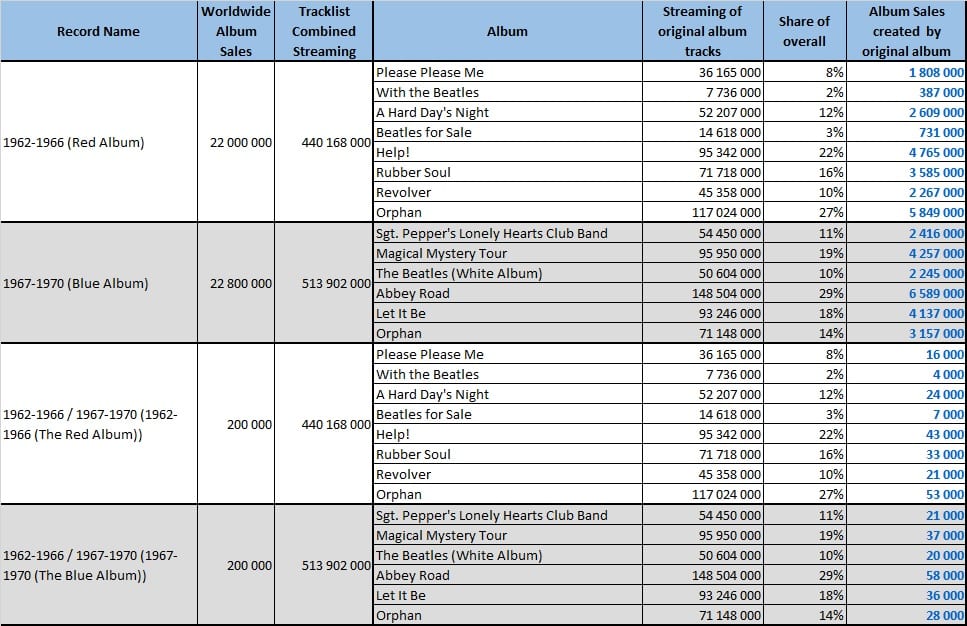
Remaining Long Format Part 6 – Double Compilations #2
Although released in the opposite way – first the full track list then each individual volumes – Rock N’ Roll Music is one more notable Beatles compilation that has been available in distinct formats.
Focusing on more rocking tunes, the album was issued not only to benefit from Paul McCartney success in 1976 but also to use favorably the growing album market in continental Europe.
The theme of the album gives a higher than usual place to the group early albums. Once again, Please Please Me appears to have generate a huge amount of sales of compilation releases.
Mostly ignored from their discography, each volume of this set sold over 4 million units including 2,65 million as part of the first comprehensive release.
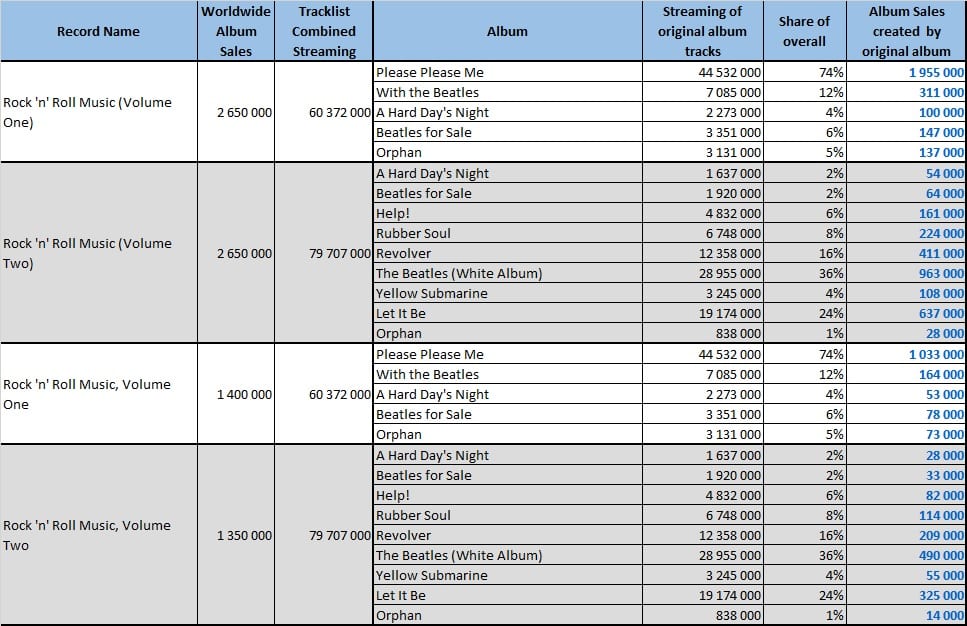
Remaining Long Format Part 7 – Double Compilations #3
Both Past Masters volumes are full of iconic songs. The irony is that they contain only what one would flag as rarities. For example, songs that weren’t part of the original UK studio albums or songs that were released long before them as stand-alone singles. Its aim was to fill the holes of the hugely hyped initial CD releases of UK studio albums in 1987.
Considering this theme, it is quite normal to see that most sales got generated by orphan songs. Hits like Love Me Do, Revolution, Get Back and Let It Be were first released as singles before getting included into Please Please Me, the While Album and Let It Be, which provides all those albums a true role in the best of appeal.

Remaining Long Format Part 8 – Anthology Project
Issued along with the television series of the same name, the three double-CDs Anthology albums sold an awful lot of discs in 1995/1996. The hype slowed down quickly and their catalog sales are abysmal in comparison to the group remaining discography, still it was a welcome addition when it came out.
The project followed the band history. As such, the first volume, which is by far the biggest seller, covers their early years. Please Please Me is one more time an incredible sales driver, much stronger than what its own sales would suggest. From Anthology 2, Help! is the main force while the White Album, Abbey Road and Let It Be are equally strong within’ Anthology 3.
As we go over their compilations, a picture is starting to be painted. The likes Rubber Soul, Revolver and Sgt Pepper’s haven’t been as strong as contributors as one would have though. The erroneous first though would be that they were stronger as studio albums, thus generated less compilation sales. The truth is the opposite – their studio album catalog sales held better than several of their other albums very precisely because they have been less cannibalized by compilations.
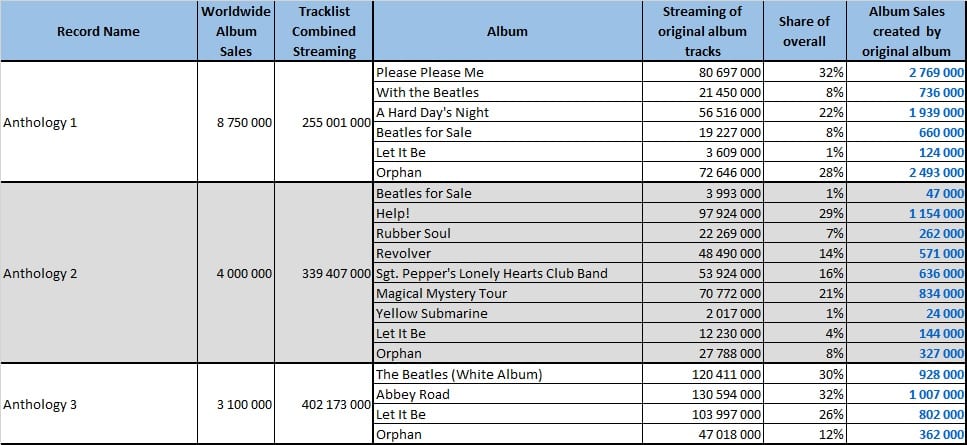
Remaining Long Format Part 9 – 00s Major Items
After exploiting studio albums (1963-1970), compilations (1973-1983), CD releases (1987-1993) and side projects (1994-1999), EMI was looking for a way to create one more sales splash with the Beatles catalog.
A awful lot of talks obviously happened in their offices prior to One release. That it was going to sell bucket loads was a safe bet. The market was better than ever, various countries saw their boundaries open and their health improve, the sound quality was at last good and, more than anything, getting all Beatles classics for the price of 1 CD only was the strongest argument one can get. It was basically the most worthy album ever released, at the best moment ever.
But, because there is a but, putting so much value into a unique CD sale is a risky move in the long run. Songs on it are easily strong enough to generate sales of several distinct releases so putting them all into one only will diminish tremendously the interest in the rest of their catalog. The question ends up being will it sell more by itself than it will cost to other releases sales?
They decided that it will. And it happened. Let’s compare UK sales of the five years before (1995-1999) and after (2001-2005) that release. The market increased 14,65% between both eras, from 1,01 billion albums sold to 1,16 billion. Nevertheless, Abbey Road shifted 324,946 units in the first time frame against only 128,144 in the second, a drastic 60,6% drop. This illustrates how important it is to re-assign sales of compilations into studio albums, because they are not newly created sales but instead a mere attractiveness transfer from one support to an other.
Impressively, the two leading sales providers of One are Help! and Let It Be. Surprising? Well, not that much. EMI knew what they were doing. The track list axing around #1 hits wasn’t only a marketing trick, it was more than anything a way to elude all LPs promoted as pure albums during the 60s. When you pick One, you still have no track at all from Rubber Soul, Sgt Pepper’s or the White Album. Thus, in spite of purchasing one best of album, their studio albums still remain absolutely essential records. Then, once you got into picking them, the complete my discography logic is triggered and consumers ultimately buy multiple Beatles records still. This is why One got considered as a positive expected value release.
Let It Be, already a strong item across all compilations, grows even more with the 3-million selling remix album of it.
Are you still really sure about which Beatles albums are the strongest at this point?
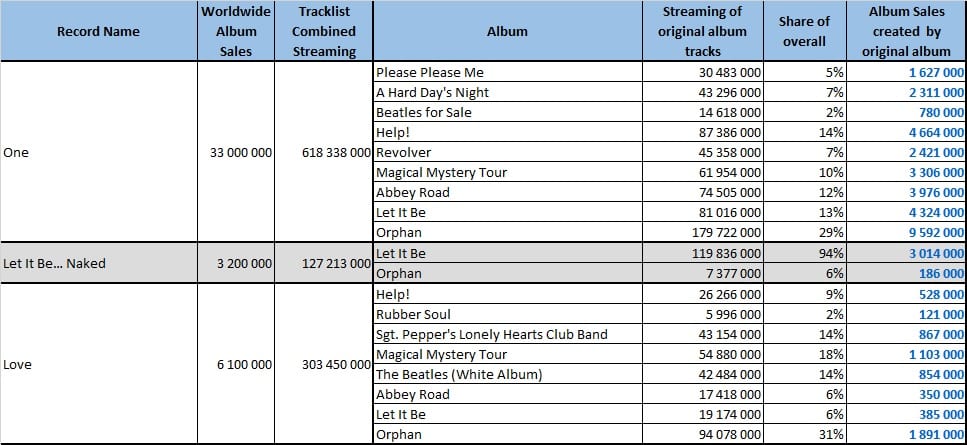
Remaining Long Format Part 10 – Minor Compilations #1
The very first compilations issued in some markets, with Greatest Hits sets coming in Australia and Oldies in various places but not in North America. Coming out in 1966, it focuses on their 1965/1966 albums.
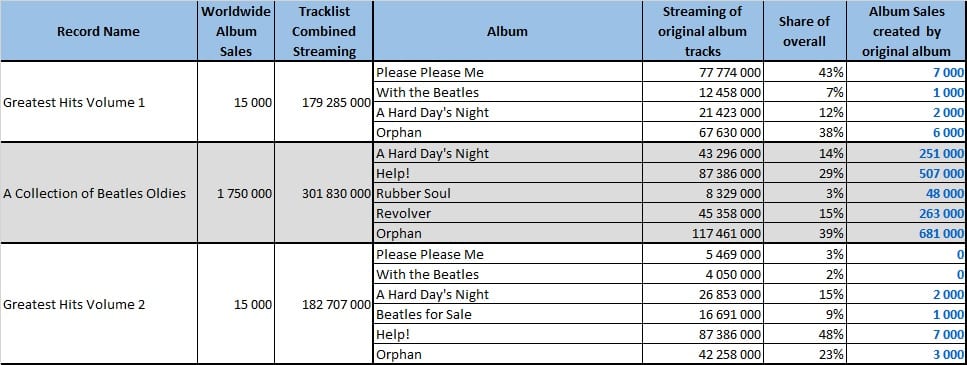
Remaining Long Format Part 11 – Minor Compilations #2
Pursuing with minor compilations we get three ones that would be rated as major for most other acts – those sets sold more than 12 million units combined.
The pattern already identified is confirmed one more time with the Orphan Album, mostly boosted by the legendary Hey Jude, along with Help! creating most of the value. It gets more and more clear that this latter album is severely underrated among the band catalog.
If you are wondering how many units sold of compilations it generated, a little more patience, everything is combined together in final results and we are getting close!
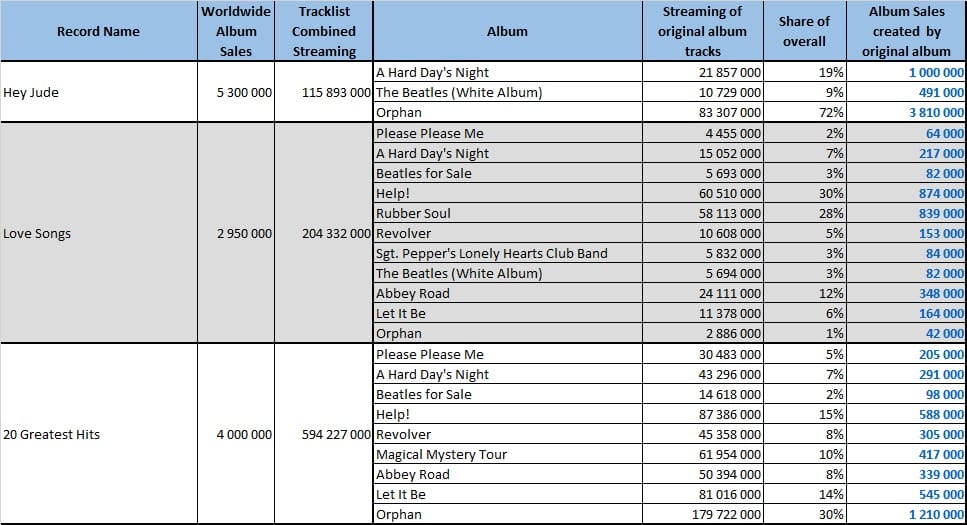
Remaining Long Format Part 12 – Minor Compilations #3
The Essential Australian best of sales are tiny but it is maybe the most revealing package of all of the Beatles compilations patterns. It focuses on songs from each studio album and the conclusion is unquestionable – Please Please Me, Help!, Magical Mystery Tour and Let It Be are home of some of the biggest Beatles smashes.
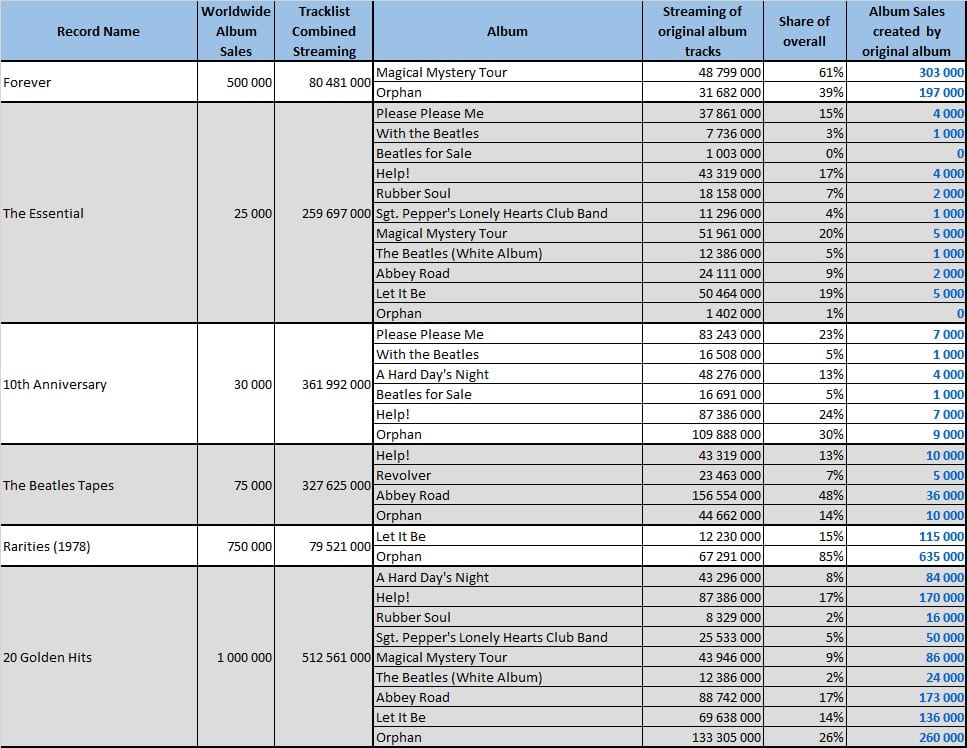
Remaining Long Format Part 13 – Minor Compilations #4
Some more local / very minor releases.
The true relevant issue from this list is 1999 album Yellow Submarine Songtrack. Unlike its name tells, it is far from being a Yellow Submarine album re-issue, in fact most of its sales have been generated by preceding LPs!
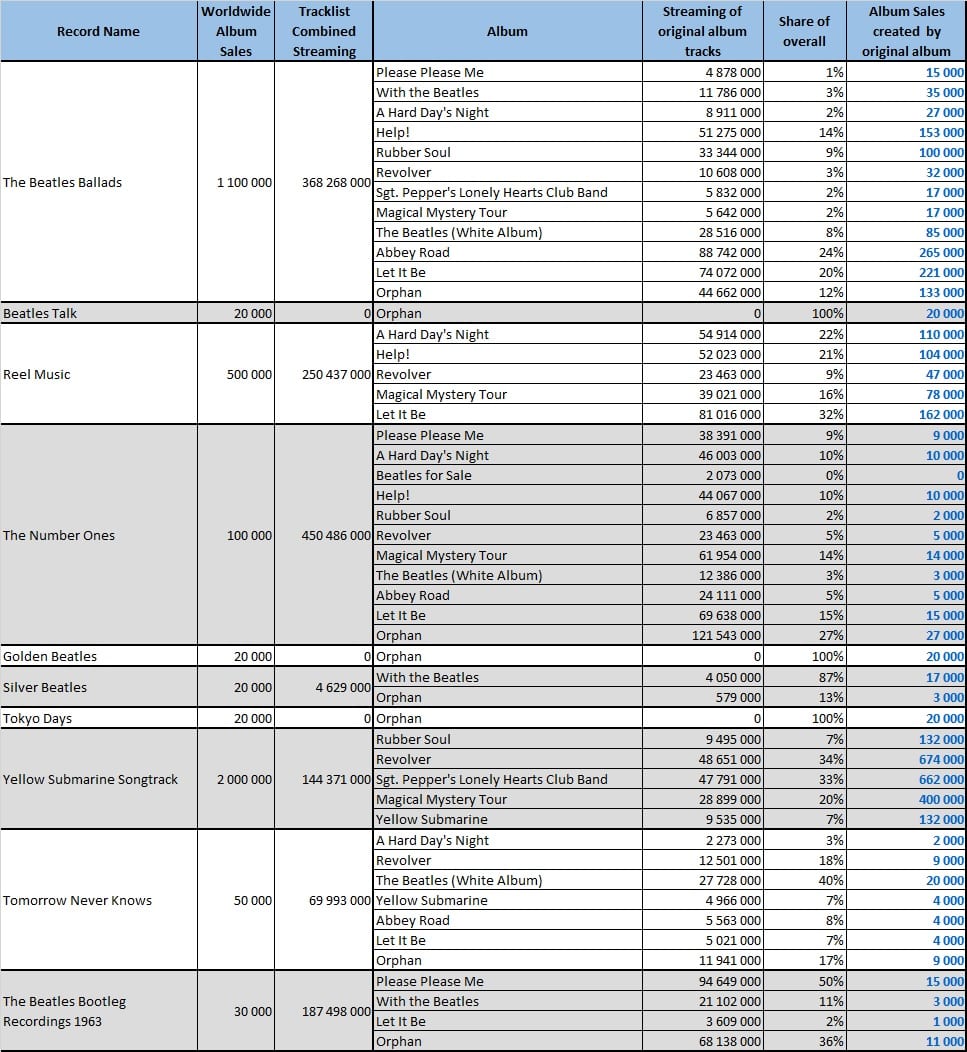
Remaining Long Format Part 14 – Live Albums
Hamburg show was recorded in 1962, Hollywood Bowl ones happened in 1964/1965 and BBC appearances from 1963 to 1965. As a result, songs performed during those nights came from the band earlier albums. Guess who’s the strongest? You got it right by now I guess – it’s Please Please Me.
Between, although hardly remembered for their live albums, those sets have now combined sales in excess of 10 million units.
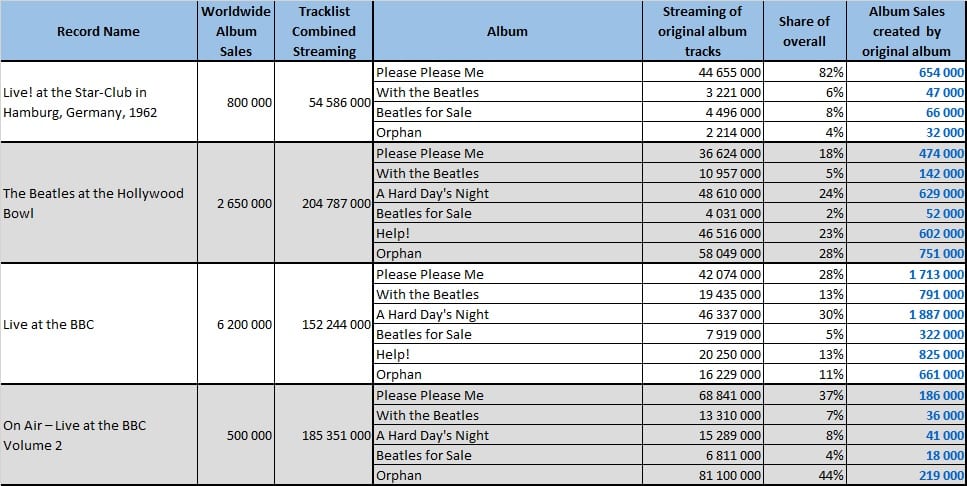
Remaining Long Format Part 15 – Music Videos #1
There is two kind of music videos. Those showing a tour / videos, which then follow a track list, and those who portray an artist, documentary-like videos. The latter ones can’t be assigned to studio albums based on songs popularity so they get automatically translated into the Orphan Album folder.
The ever-hyped Beatles invasion appears one more time on videos like The First U.S. Visit which is mostly made of Please Please Me hits.
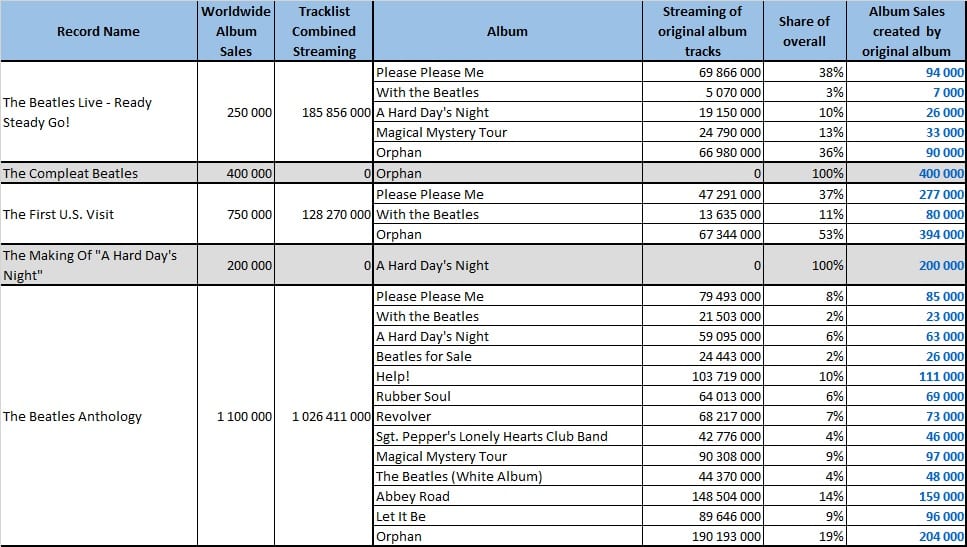
Remaining Long Format Part 16 – Music Videos #2
Pretty much all of the same – lives from their early days or stories about how they made it big, the result is no different with 1963-1965 albums picking almost all those sales between them.
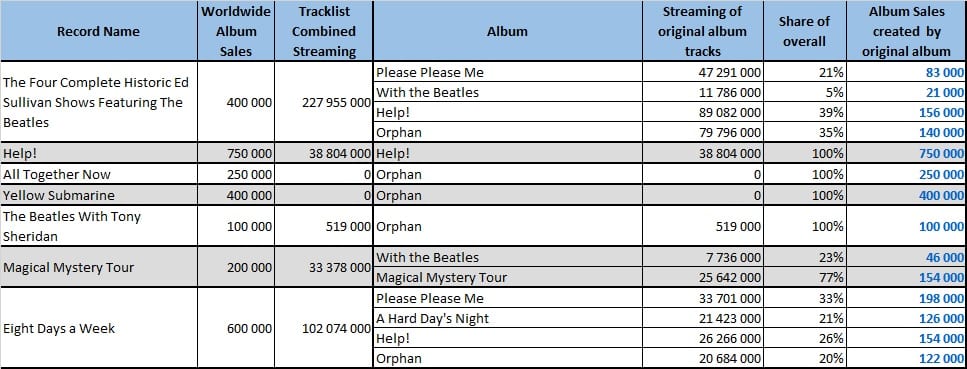
Remaining Long Format Part 17 – Box Sets #1
For box sets too there is two kind of packages – extensive compilations with a random assembly of tracks and previously issued albums packaged together.
In the latter case, sales are attributed into each album part of the box set. In a CSPC logic that highlights the dependencies and the cannibalization effect between all products of an artist. It is fundamental to take into account that a consumer of such a career-covering box won’t be buying individual albums anymore. Thus, they all get awarded the sale.
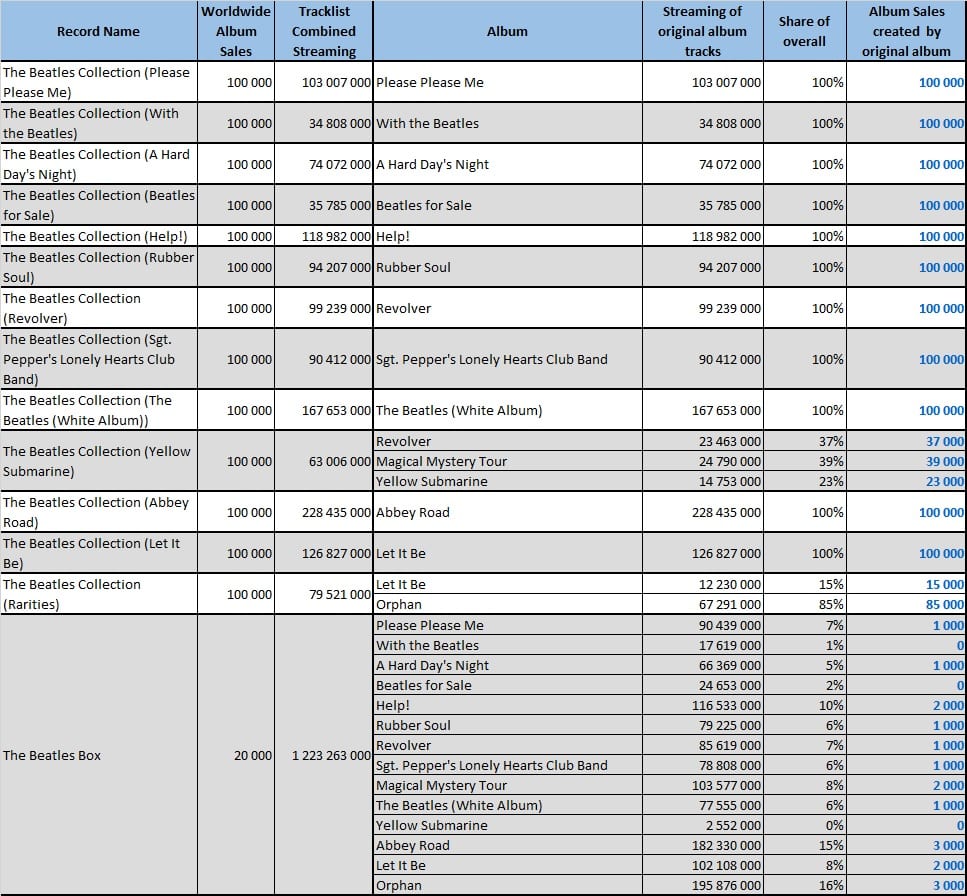
Remaining Long Format Part 18 – Box Sets #2
Box Set is the one from 1988 which encapsulated all CD releases. Capitol Albums is the pair of 4-CD packages that reissued the original US albums first available from 1964 to 1966 and deleted in 1988.
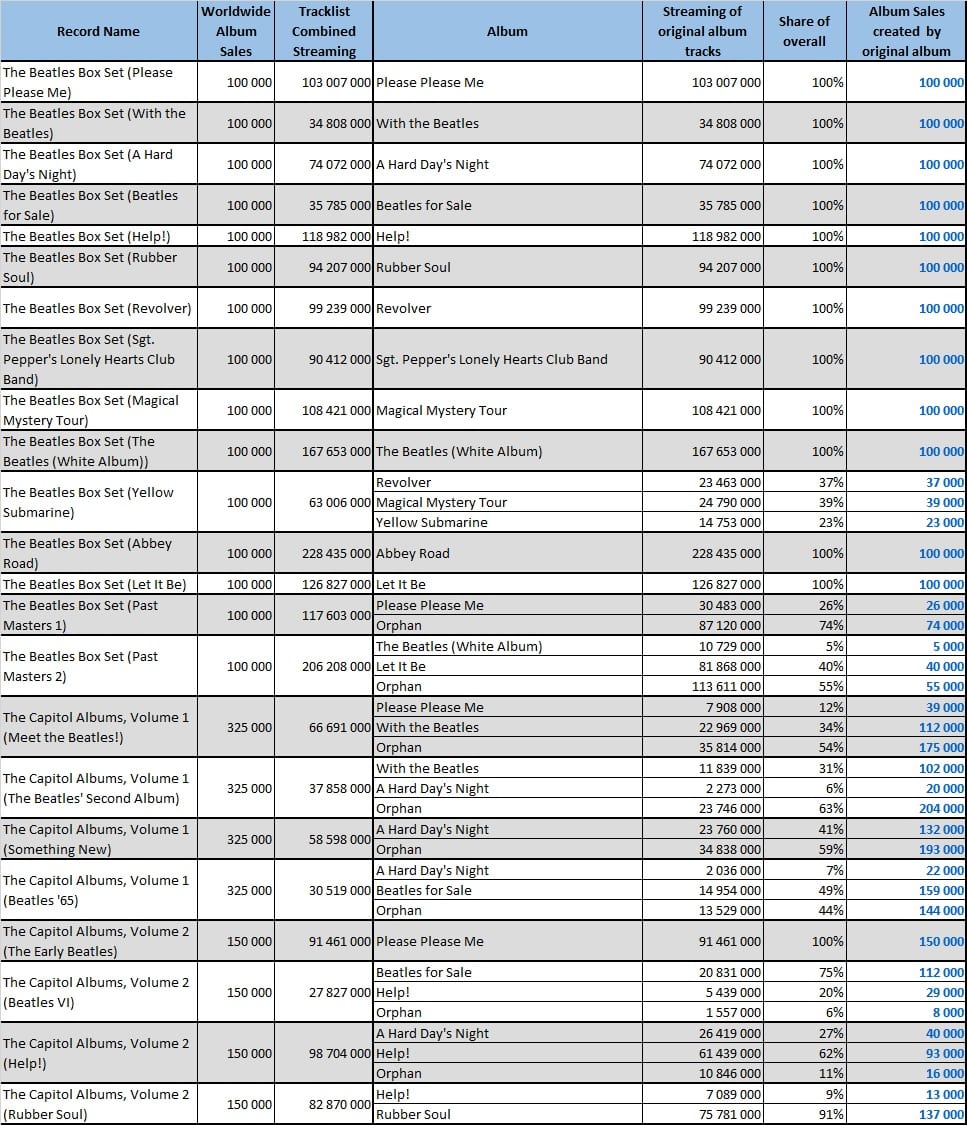
Remaining Long Format Part 19 – Box Sets #3
Just like the 1987 CD releases campaign was concluded with a huge box set, the 2009 remasters one too got its boxes. Two for the price of one – well, not literally – the Mono and the Stereo box. Both sets sold extremely well with the later concluding on 800,000 units to date, each of them re-assigned to albums which are part of it.
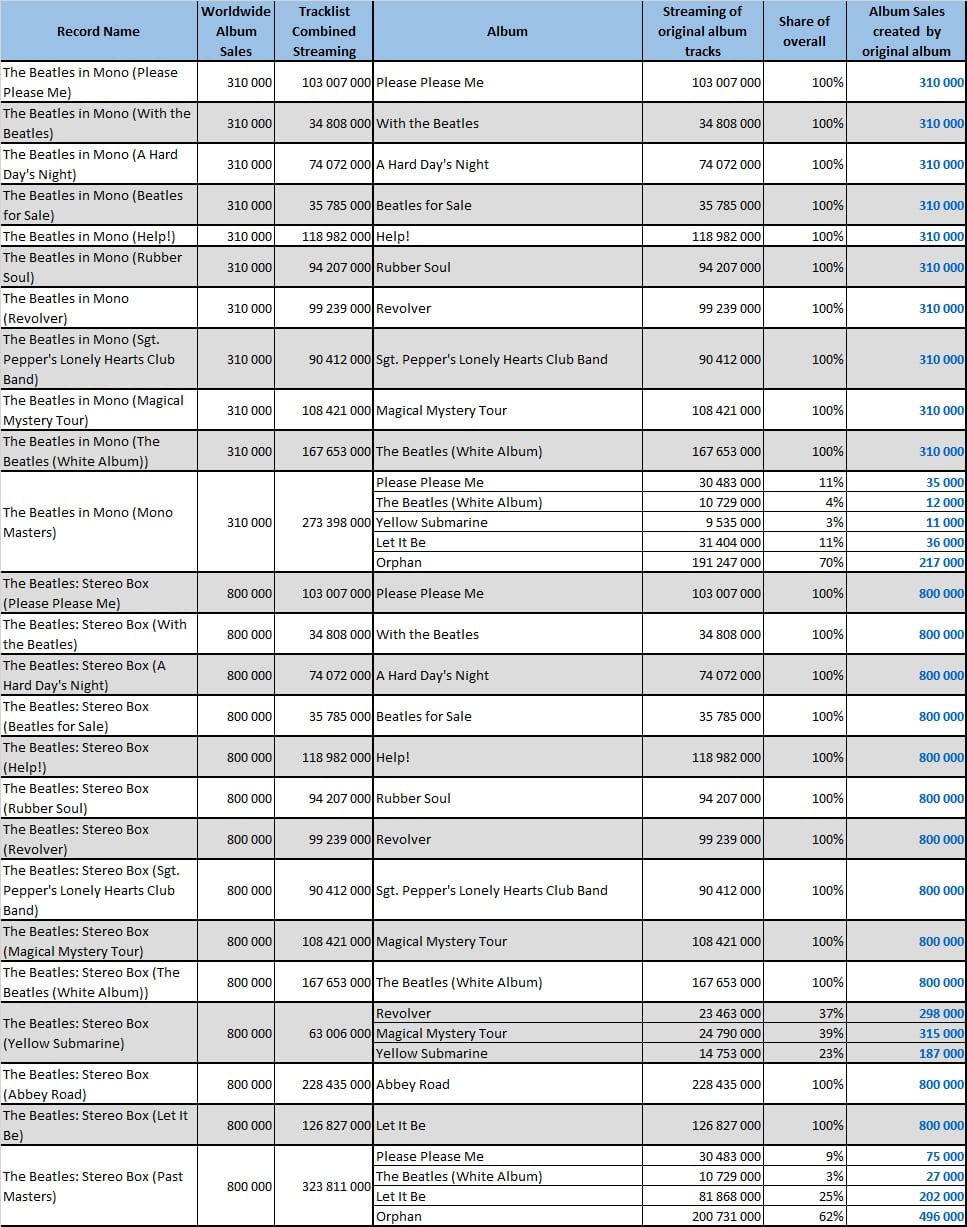
Remaining Long Format Part 20 – Box Sets #4
And just like a few years earlier, initial US Capitol albums were reissued again in 2014 in their versions remastered in 2009.
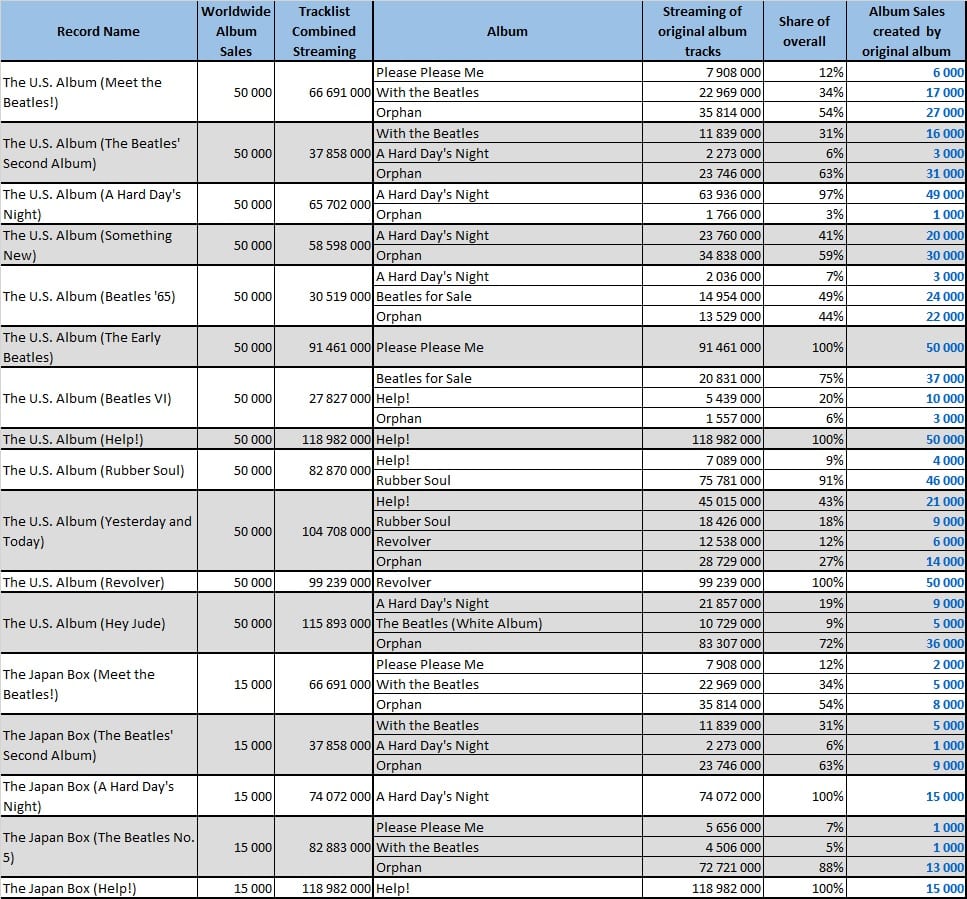
Full Length related records Sales – Summary
Here is the most underestimated indicator of an album success – the amount of compilation sales of all kinds it generated. Due to the dependency of the own studio album sales on those releases, they are a key piece of the jigsaw.
The first five UK albums sold less by themselves because of studio albums look a like issued on other markets, EP sales hitting them too as well as live sets from that era. All that added value gets retrieved to them as it appears inside the table.
Albums like Please Please Me, Help!, Abbey Road and Let It Be were the primary drivers of major compilation sales. In the other side, ongoing catalog sales of Sgt Pepper’s remained strong due to its little help in other packages results. Rubber Soul, the White Album and Revolver only brought relatively low support to the band catalog strength outside of their own sales too.
Once putting all those units together, Please Please Me ends up as the most recycled album of the band. The worth it created concluded on a terrific 21 million of compilation sales.
Thanks to their double discography – albums and stand-alone singles – the Orphan Album has an unreal power, totalling 53 million sales generated.
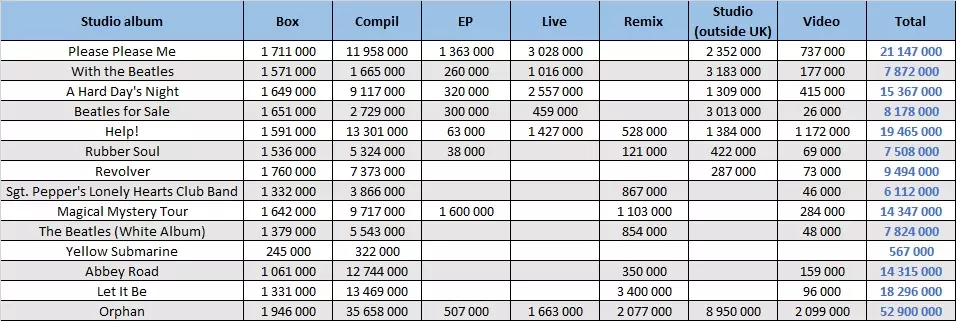
BONUS – Original Compilation Sales
NB: N/A means no specific number is available. Sales from the country are still accounted for in Worldwide estimate by using figures pattern of both the artist and the country market. Countries not displayed in this fixed panel are also factored in.
1962-1966 (The Red Album) (1973)
- America
- US – 8,225,000
- Canada – 825,000
- Argentina – 210,000
- Brazil – N/A
- Mexico – N/A
- Asia
- Japan – 1,920,000
- Oceania
- Australia – 380,000
- New Zealand – 70,000
- Europe – 8,870,000
- UK – 1,865,000
- France – 1,360,000
- Germany – 2,250,000
- Italy – 200,000
- Spain – 475,000
- Sweden – 150,000
- Netherland – 450,000
- Switzerland – 200,000
- Austria – 195,000
- Finland – N/A
- World – 22,000,000
1967-1970 (The Blue Album) (1973)
- America
- US – 8,975,000
- Canada – 900,000
- Argentina – 190,000
- Brazil – N/A
- Mexico – N/A
- Asia
- Japan – 1,760,000
- Oceania
- Australia – 420,000
- New Zealand – 70,000
- Europe – 9,050,000
- UK – 1,915,000
- France – 1,490,000
- Germany – 2,150,000
- Italy – 300,000
- Spain – 425,000
- Sweden – 200,000
- Netherland – 425,000
- Switzerland – 200,000
- Austria – 175,000
- Finland – N/A
- World – 22,800,000
Rock ‘n’ Roll Music (1976)
:format(jpeg):mode_rgb():quality(40)/discogs-images/R-1733989-1300101167.jpeg.jpg)
- America
- US – 1,300,000
- Canada – 130,000
- Argentina – 25,000
- Brazil – N/A
- Mexico – N/A
- Asia
- Japan – 80,000
- Oceania
- Australia – 75,000
- New Zealand – 20,000
- Europe – 860,000
- UK – 150,000
- France – 125,000
- Germany – 150,000
- Italy – 75,000
- Spain – 100,000
- Sweden – 20,000
- Netherland – 40,000
- Switzerland – N/A
- Austria – 15,000
- Finland – N/A
- World – 2,650,000
The Beatles at the Hollywood Bowl (1977)

- America
- US – 950,000
- Canada – 110,000
- Argentina – N/A
- Brazil – N/A
- Mexico – N/A
- Asia
- Japan – 345,000
- Oceania
- Australia – 50,000
- New Zealand – 10,000
- Europe – 900,000
- UK – 315,000
- France – 165,000
- Germany – 150,000
- Italy – 50,000
- Spain – N/A
- Sweden – 20,000
- Netherland – N/A
- Switzerland – N/A
- Austria – 15,000
- Finland – N/A
- World – 2,650,000
Love Songs (1977)
:format(jpeg):mode_rgb():quality(40)/discogs-images/R-3006540-1332113853.jpeg.jpg)
- America
- US – 1,500,000
- Canada – 150,000
- Argentina – 5,000
- Brazil – N/A
- Mexico – N/A
- Asia
- Japan – 125,000
- Oceania
- Australia – 50,000
- New Zealand – 10,000
- Europe – 970,000
- UK – 250,000
- France – 150,000
- Germany – N/A
- Italy – N/A
- Spain – 250,000
- Sweden – N/A
- Netherland – N/A
- Switzerland – N/A
- Austria – N/A
- Finland – N/A
- World – 2,950,000
20 Greatest Hits (1982)
:format(jpeg):mode_rgb():quality(40)/discogs-images/R-469240-1432136300-7039.jpeg.jpg)
- America
- US – 2,200,000
- Canada – 325,000
- Argentina – N/A
- Brazil – N/A
- Mexico – N/A
- Asia
- Japan – 125,000
- Oceania
- Australia – N/A
- New Zealand – 35,000
- Europe – 1,000,000
- UK – 500,000
- France – N/A
- Germany – N/A
- Italy – 150,000
- Spain – N/A
- Sweden – N/A
- Netherland – 25,000
- Switzerland – N/A
- Austria – N/A
- Finland – N/A
- World – 4,000,000
Past Masters, Volume One (1988)
- America
- US – 1,300,000
- Canada – 70,000
- Argentina – 75,000
- Brazil – N/A
- Mexico – N/A
- Asia
- Japan – 150,000
- Oceania
- Australia – 50,000
- New Zealand – 10,000
- Europe – 820,000
- UK – 330,000
- France – 85,000
- Germany – N/A
- Italy – N/A
- Spain – N/A
- Sweden – N/A
- Netherland – N/A
- Switzerland – N/A
- Austria – N/A
- Finland – N/A
- World – 2,650,000
Past Masters, Volume Two (1988)
- America
- US – 1,850,000
- Canada – 100,000
- Argentina – 75,000
- Brazil – N/A
- Mexico – N/A
- Asia
- Japan – 170,000
- Oceania
- Australia – 50,000
- New Zealand – 10,000
- Europe – 920,000
- UK – 365,000
- France – 95,000
- Germany – N/A
- Italy – N/A
- Spain – N/A
- Sweden – N/A
- Netherland – N/A
- Switzerland – N/A
- Austria – N/A
- Finland – N/A
- World – 3,400,000
Live at the BBC (1994)
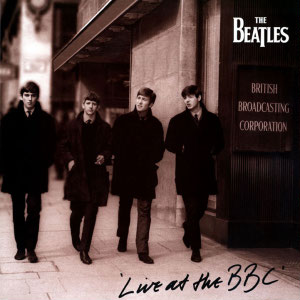
- America
- US – 1,900,000
- Canada – 400,000
- Argentina – 60,000
- Brazil – 250,000
- Mexico – N/A
- Asia
- Japan – 530,000
- Oceania
- Australia – 85,000
- New Zealand – 10,000
- Europe – 2,420,000
- UK – 880,000
- France – 370,000
- Germany – 300,000
- Italy – 100,000
- Spain – 150,000
- Sweden – 45,000
- Netherland – 100,000
- Switzerland – 40,000
- Austria – 30,000
- Finland – N/A
- World – 6,200,000
Anthology 1 (1995)

- America
- US – 4,400,000
- Canada – 480,000
- Argentina – 30,000
- Brazil – N/A
- Mexico – N/A
- Asia
- Japan – 700,000
- Oceania
- Australia – 150,000
- New Zealand – 20,000
- Europe – 2,340,000
- UK – 785,000
- France – 255,000
- Germany – 390,000
- Italy – 150,000
- Spain – 110,000
- Sweden – 70,000
- Netherland – 80,000
- Switzerland – 55,000
- Austria – 30,000
- Finland – 25,000
- World – 8,750,000
Anthology 2 (1996)

- America
- US – 2,100,000
- Canada – 230,000
- Argentina – 20,000
- Brazil – N/A
- Mexico – N/A
- Asia
- Japan – 325,000
- Oceania
- Australia – 50,000
- New Zealand – 7,000
- Europe – 960,000
- UK – 355,000
- France – 135,000
- Germany – 145,000
- Italy – 40,000
- Spain – 50,000
- Sweden – 20,000
- Netherland – 35,000
- Switzerland – 10,000
- Austria – 10,000
- Finland – 5,000
- World – 4,000,000
Anthology 3 (1996)



- America
- US – 1,700,000
- Canada – 180,000
- Argentina – 15,000
- Brazil – N/A
- Mexico – N/A
- Asia
- Japan – 240,000
- Oceania
- Australia – 40,000
- New Zealand – 5,000
- Europe – 710,000
- UK – 275,000
- France – 75,000
- Germany – 120,000
- Italy – 50,000
- Spain – 25,000
- Sweden – 15,000
- Netherland – 25,000
- Switzerland – 5,000
- Austria – 5,000
- Finland – 5,000
- World – 3,100,000
Yellow Submarine Songtrack (1999)


- America
- US – 925,000
- Canada – 100,000
- Argentina – 40,000
- Brazil – N/A
- Mexico – N/A
- Asia
- Japan – 290,000
- Oceania
- Australia – N/A
- New Zealand – N/A
- Europe – 440,000
- UK – 155,000
- France – 35,000
- Germany – 100,000
- Italy – 30,000
- Spain – 15,000
- Sweden – 5,000
- Netherland – 10,000
- Switzerland – 5,000
- Austria – 10,000
- Finland – N/A
- World – 2,000,000
1 (2000)
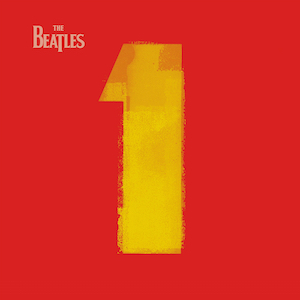

- America
- US – 12,700,000
- Canada – 1,625,000
- Argentina – 200,000
- Brazil – 475,000
- Mexico – N/A
- Asia
- Japan – 2,700,000
- Oceania
- Australia – 825,000
- New Zealand – 225,000
- Europe – 11,090,000
- UK – 3,275,000
- France – 1,060,000
- Germany – 1,900,000
- Italy – 1,250,000
- Spain – 725,000
- Sweden – 250,000
- Netherland – 250,000
- Switzerland – 180,000
- Austria – 190,000
- Finland – 80,000
- World – 33,000,000
Let It Be… Naked (2003)
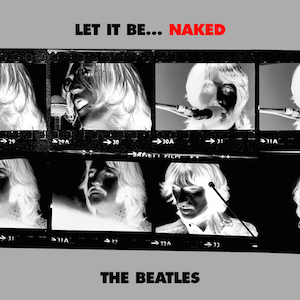

- America
- US – 1,300,000
- Canada – 100,000
- Argentina – N/A
- Brazil – 31,000
- Mexico – N/A
- Asia
- Japan – 525,000
- Oceania
- Australia – 40,000
- New Zealand – 5,000
- Europe – 890,000
- UK – 295,000
- France – 70,000
- Germany – 100,000
- Italy – 125,000
- Spain – 60,000
- Sweden – 45,000
- Netherland – 30,000
- Switzerland – 10,000
- Austria – 10,000
- Finland – N/A
- World – 3,200,000
Love (2006)
.jpg)
- America
- US – 2,500,000
- Canada – 300,000
- Argentina – 90,000
- Brazil – 50,000
- Mexico – 75,000
- Asia
- Japan – 300,000
- Oceania
- Australia – 150,000
- New Zealand – 25,000
- Europe – 2,300,000
- UK – 830,000
- France – 260,000
- Germany – 375,000
- Italy – 175,000
- Spain – 65,000
- Sweden – 90,000
- Netherland – 50,000
- Switzerland – 35,000
- Austria – 30,000
- Finland – 15,000
- World – 6,100,000
BONUS: Total Album (all types) Sales per Country
- America
- US – 168,270,000
- Canada – 15,130,000
- Argentina – 6,080,000
- Brazil – 4,760,000
- Mexico – N/A
- Asia – 33,180,000
- Japan – 23,030,000
- Oceania
- Australia – 5,380,000
- New Zealand – 1,200,000
- Europe – 86,230,000
- UK – 33,140,000
- France – 8,610,000
- Germany – 14,010,000
- Italy – 4,250,000
- Spain – 3,750,000
- Sweden – 1,610,000
- Netherland – 3,420,000
- Switzerland – 1,280,000
- Austria – 1,120,000
- Finland – 460,000
- World – 333,145,000
Please note that some of the countries totals may be slightly incomplete when the figure is N/A for minor releases. Countries with too much missing information to be precise enough are listed as N/A.
THE BEATLES CAREER CSPC RESULTS
So, after checking all figures, how many overall equivalent album sales each Beatles’ album achieved? Well, at this point we barely need to do the addition of all figures defined all over this article!
In the following results table, all categories display figures in equivalent album sales. If different, pure sales are listed between parentheses.
As a reminder:
- Studio Album: sales of the original album
- Other Releases: sales of compilations generated thanks to the album
- Physical Singles: sales of physical singles from the album (ratio 3/10)
- Download Singles: sales of digital singles from the album (ratio 1,5/10)
- Streaming: equivalent album sales of all the album tracks (ratio 1/1500 for Audio stream and 1/6750 for Video stream)
Artist career totals
See where the artist ranks among remaining singers
Overall, those results are quite shocking. It is so by both how big and how weak they are. Big because the average sales of all albums is insane, weak because no album is higher than 43 million, a somehow disappointing result. The leader is expectedly Abbey Road.
Shocking too because both Let It Be and Help! surge over classics like Sgt Pepper’s and White Album. Please Please Me too tops this latter album while Revolver and Rubber Soul end up at #9 and #10 only.
This highly intriguying ranking reveals one deep reality even more important than which albums appear high or low. All those albums CSPC totals illustrate a unique pattern. Yellow Submarine apart, all albums stand between 14 million and 43 million, a 3 to 1 ratio between the biggest and the weakest LP. From the second to the tenth most popular, the gap – 33 million to 23 million – is very, very small, something never seen on all other artists breakdowns. All albums catalog sales have been pretty much exactly the reverse of their strength inside the group’s compilations. Once putting everything together, all figures are incredibly close. What is the ultimate meaning of this situation? It means that unlike other artists, consumers haven’t been purchasing one hit, nor one album, not even two or three classics. The final target of the average Beatles consumers was to buy, whatever the form / combo of packages, the band’s full discography. Isn’t that the real signature of the greatest success of all-time?
Cumulatively, the band sold the out of this world total of 405,7 million equivalent albums. Up to now, the biggest artist studied was Madonna with 244 million units. You will need to add to her discography the one of ABBA – 156,6 million – to come close to the heights of the Beatles. They also top Led Zeppelin and U2 combined total. Do I really need to say something more?
As usual, feel free to comment and / or ask a question!
Sources: IFPI, Spotify, Chartmasters.org.
BIGGEST TRACKS – The Beatles
The list of most successful songs is compiled in album equivalent sales generated by each of them. It includes the song own physical singles sales with a 0,3 weighting, its download and streaming sales with appropriate weighting too plus its share among sales of all albums on which it is featured.
1 1963 – I Want to Hold Your Hand [Orphan] – 15,690,000
2 1970 – Let It Be [Let It Be] – 15,420,000
3 1965 – Yesterday [Help!] – 12,920,000
4 1969 – Come Together [Abbey Road] – 12,870,000
5 1968 – Hey Jude [Orphan] – 12,090,000
6 1969 – Here Comes the Sun [Abbey Road] – 11,460,000
7 1962 – Love Me Do [Please Please Me] – 11,040,000
8 1964 – A Hard Day’s Night [A Hard Day’s Night] – 9,820,000
9 1963 – Twist and Shout [Please Please Me] – 9,800,000
10 1964 – Can’t Buy Me Love [A Hard Day’s Night] – 9,230,000
11 1965 – Help! [Help!] – 9,030,000
12 1963 – She Loves You [Orphan] – 8,430,000
13 1969 – Get Back [Let It Be] – 8,140,000
14 1967 – All You Need Is Love [Magical Mystery Tour] – 7,900,000
15 1966 – Yellow Submarine [Revolver] – 7,890,000
16 1964 – Eight Days a Week [Beatles for Sale] – 6,820,000
17 1969 – Something [Abbey Road] – 6,440,000
18 1966 – Eleanor Rigby [Revolver] – 6,290,000
19 1965 – In My Life [Rubber Soul] – 6,200,000
20 1965 – Ticket to Ride [Help!] – 6,180,000
21 1967 – Lucy in the Sky with Diamonds [Sgt. Pepper’s Lonely Hearts Club Band] – 5,990,000
22 1967 – Sgt. Pepper’s Lonely Hearts Club Band [Sgt. Pepper’s Lonely Hearts Club Band] – 5,580,000
23 1967 – Penny Lane [Magical Mystery Tour] – 5,540,000
24 1967 – Hello, Goodbye [Magical Mystery Tour] – 5,440,000
25 1964 – I Feel Fine [Orphan] – 5,400,000
26 1967 – A Day in the Life [Sgt. Pepper’s Lonely Hearts Club Band] – 4,960,000
27 1965 – Norwegian Wood (This Bird Has Flown) [Rubber Soul] – 4,610,000
28 1967 – With a Little Help from My Friends [Sgt. Pepper’s Lonely Hearts Club Band] – 4,050,000
29 1963 – All My Loving [With the Beatles] – 4,010,000
30 1968 – While My Guitar Gently Weeps [The Beatles (White Album)] – 3,860,000
31 1968 – Blackbird [The Beatles (White Album)] – 3,850,000
32 1970 – The Long and Winding Road [Let It Be] – 3,680,000
33 1965 – Day Tripper [Orphan] – 3,560,000
34 1968 – Revolution [The Beatles (White Album)] – 3,350,000
35 1966 – Paperback Writer [Orphan] – 3,150,000
36 1965 – We Can Work It Out [Orphan] – 3,060,000
37 1964 – And I Love Her [A Hard Day’s Night] – 3,030,000
38 1963 – I Saw Her Standing There [Please Please Me] – 3,020,000
39 1968 – Lady Madonna [Orphan] – 2,880,000
40 1963 – From Me to You [Orphan] – 2,850,000
41 1967 – Strawberry Fields Forever [Magical Mystery Tour] – 2,810,000
42 1970 – Across the Universe [Let It Be] – 2,740,000
43 1967 – I Am the Walrus [Magical Mystery Tour] – 2,670,000
44 1968 – Ob-La-Di, Ob-La-Da [The Beatles (White Album)] – 2,660,000
45 1965 – Michelle [Rubber Soul] – 2,390,000
46 1969 – The Ballad of John and Yoko [Orphan] – 2,310,000
47 1965 – Nowhere Man [Rubber Soul] – 2,240,000
48 1967 – When I’m Sixty-Four [Sgt. Pepper’s Lonely Hearts Club Band] – 2,060,000
49 1965 – Drive My Car [Rubber Soul] – 2,010,000
50 1968 – Back in the U.S.S.R. [The Beatles (White Album)] – 2,000,000
51 1969 – Octopus’s Garden [Abbey Road] – 1,870,000
52 1963 – Please Please Me [Please Please Me] – 1,840,000
53 1967 – She’s Leaving Home [Sgt. Pepper’s Lonely Hearts Club Band] – 1,810,000
54 1963 – Till There Was You [With the Beatles] – 1,640,000
55 1965 – You’ve Got to Hide Your Love Away [Help!] – 1,630,000
56 1963 – Roll Over Beethoven [With the Beatles] – 1,620,000
57 1966 – Got to Get You into My Life [Revolver] – 1,580,000
58 1965 – Girl [Rubber Soul] – 1,550,000
59 1967 – The Fool on the Hill [Magical Mystery Tour] – 1,470,000
60 1969 – Oh! Darling [Abbey Road] – 1,420,000
61 1967 – Getting Better [Sgt. Pepper’s Lonely Hearts Club Band] – 1,390,000
62 1968 – Helter Skelter [The Beatles (White Album)] – 1,250,000
63 1966 – Taxman [Revolver] – 1,240,000
63 1967 – Within You Without You [Sgt. Pepper’s Lonely Hearts Club Band] – 1,240,000
65 1969 – Because [Abbey Road] – 1,230,000
66 1969 – Hey Bulldog [Yellow Submarine] – 1,220,000
67 1967 – Being for the Benefit of Mr. Kite! [Sgt. Pepper’s Lonely Hearts Club Band] – 1,200,000
68 1967 – Lovely Rita [Sgt. Pepper’s Lonely Hearts Club Band] – 1,170,000
69 1967 – Fixing a Hole [Sgt. Pepper’s Lonely Hearts Club Band] – 1,150,000
70 1964 – Rock and Roll Music [Beatles for Sale] – 1,120,000
71 1969 – Don’t Let Me Down [Orphan] – 1,060,000
72 1969 – I Want You (She’s So Heavy) [Abbey Road] – 1,040,000
72 1963 – Do You Want to Know a Secret? [Please Please Me] – 1,040,000
72 1964 – I’ll Follow the Sun [Beatles for Sale] – 1,040,000
75 1961 – My Bonnie [Orphan] – 1,030,000
We have more for you…
… The Beatles‘ streaming masters analysis
… checking out the upcoming artists or even voting for them!
